NEWS DESSC LET’S



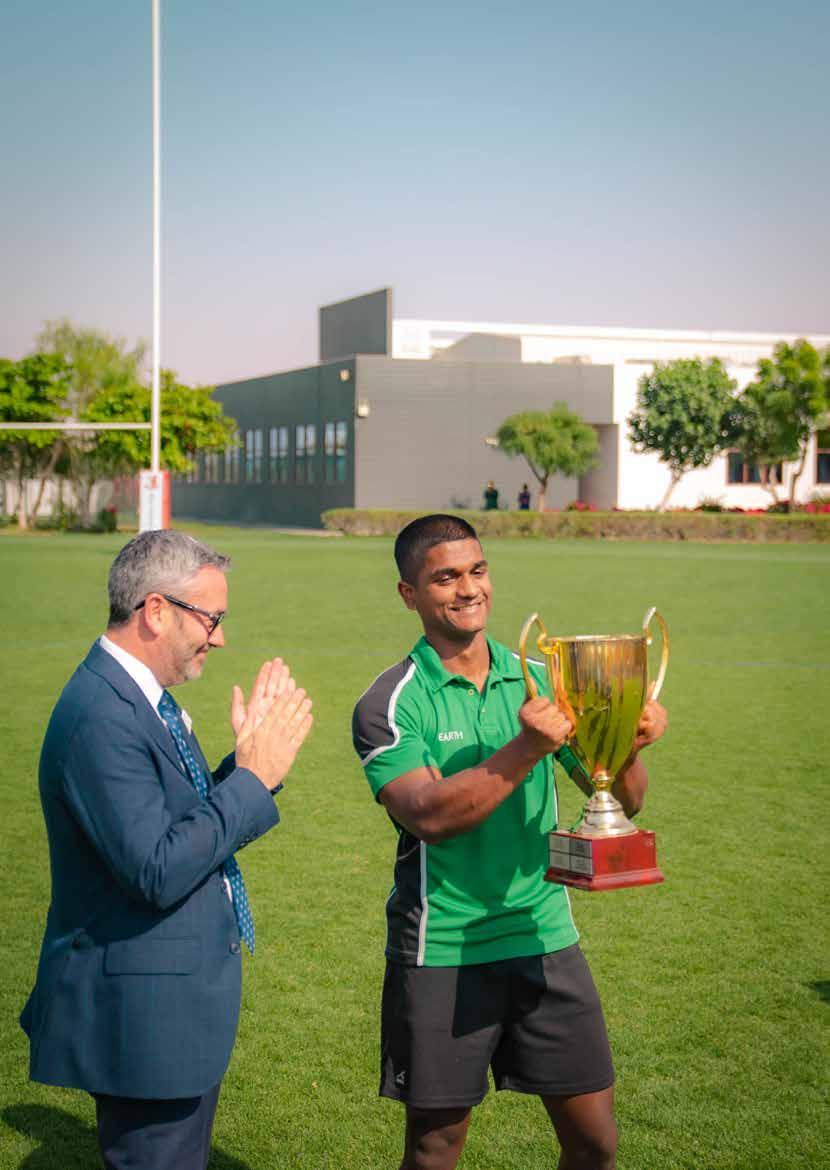
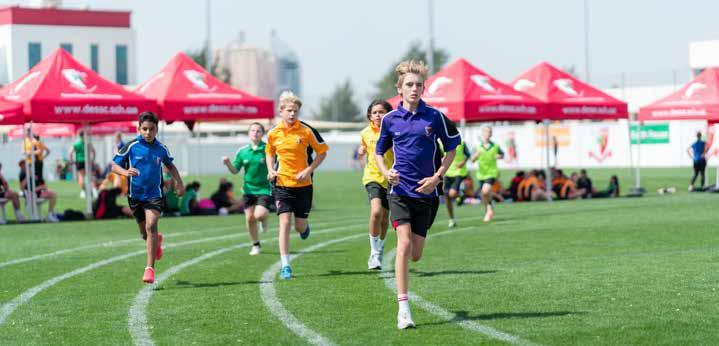
It was as if ‘Kool & the Gang’ had DESS in mind as they penned the lyrics to their number one hit, ‘Celebration’. With the song referring to celebrations lasting throughout the years, and reaching people all over the world, it most certainly fits the DESS way!
It is with great excitement that we celebrate the 60th anniversary of DESS. It is a testament to the hard work and dedication of so many people, past and present, that we have achieved such a milestone and forged a reputation for excellence, success and inclusivity. This special year at DESS provides the perfect opportunity to reflect on our rich history, and to recognise the many people who have contributed to the success of our school.
Through this uplifting, celebratory edition you will get to know and learn about some of the fascinating personalities and characters who have, or still are, shaping our unique school. It is so important to remember the people who have been part of our school since its

inception and have helped shape it into the institution it is today. You will hear from the President of our Trustees, Mr Vince Cook, who has his own cause for celebration, as well as alumni and the ‘behind the scenes’ unsung heroes who provide the platform to allow the DESS magic to happen.

Ruth Gibson, Deputy Headteacher, writes passionately about how DESS has always been a place where everyone can come together to learn and grow, and how its unique culture has been shaped by the diverse backgrounds and perspectives that make up the DESS community. We can all be proud of being part of this wonderful family and feel lucky to have an incredibly rich history full of amazing stories and memories. Paul Sowerby’s article containing recollections from alumni, including the first ever DESS teacher, is a fascinating and entertaining glimpse into this past. At DESS, we are also proud of our connection with the UAE and the values and culture we have here. Our school has strong ties to our home
country, and Omaima Shahwan, writing ‘A Grandmother’s Story’, recognises how our celebrations are an opportunity to honor and recognise the values, heritage and culture of our home country.
We can all learn from the experiences of those who have come before us, and the lessons they can teach us about our school, our community and our country. Let us all come together and celebrate the 60th anniversary of DESS! We have a unique and special community, and we should be proud of all that has been achieved and all that is yet to come.
So, sit back and enjoy a literary journey celebrating the past and present whilst dreaming of what may come in the next sixty years of DESSC...
Happy reading,
Tony
There is an ancient Chinese proverb that states that, “Rewards and punishments are the lowest form of education.” We must be careful when we read this statement, not to think that rewards and the celebration of success are therefore of little importance in schools and colleges. The spirit of the proverb lies in the understanding that rewards form the most fundamental foundations of changing behaviours, not just in humans, but in many other forms of life. For those of you who have tried to train a pet, or who have watched any animal training documentaries, you will know the powerful impact that rewards can have.
This volume of From The News DESSC has a firm focus on the importance of rewards, prizes and celebrations within our College community. We know, that by giving public recognition to our students in a wide variety of formats, that we will encourage our young learners to develop the very best aspects of their character that we value. A love of learning, curiosity, bravery, work ethic – these are just a few of the many traits that we endeavour to nurture in our students as they grow and mature into adults. Not so that they have a better chance of impressing a potential employer, or to boost a resumé or CV, but so that they have a firm understanding of the tools and traits that will enable them to be the most prepared for their journey through life and the most equipped to have the greatest positive impact on those around them.
There is always so much to celebrate and so much to reward and praise
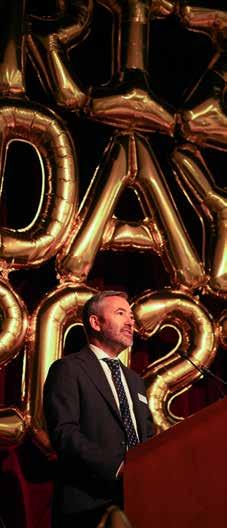
our students for. Success in local and national competitions is touched upon in the article written by Mr El Taher, in which he tells us about some of our students’ achievements in the Emirates Airline Festival of Literature competition. Two of our Year 13 students share their experience of successfully applying to some of the world’s best universities, which will hopefully inspire others to follow in their footsteps. We also hear about Kenmi, one of our remarkable Year 8 students, who has recently published her first novella, a story that is worthy of praise and reward.
Our teaching staff have also been celebrating recently. Winning the award for International BTEC Centre of the Year firmly recognised the effort that has gone into building strong vocational pathways into our post-16 provision. You can read more about this in the article written by Mr Davies, Head of Vocational Education. Our teachers have also had the opportunity to celebrate the incredible levels of expertise on display within the classrooms, during the recent Pineapple Week that took place in the second half of this term. We firmly believe that the best professional development that is available to us at DESC can be found within our own classrooms. Pineapple Week gave our teachers the opportunity to dare, excel and create within their teaching environments and then share those experiences with other teachers who were available to drop into any lesson that they wanted to.
Finally, in the new post-post-Covid world that we now live in, we have all been able to celebrate the return of international trips and fieldwork to DESC. You will find articles on the recent trip to Japan and the return of Geography fieldwork activities.
I would like to thank all of the contributors to this edition and I really hope you enjoy reading the articles.
Enjoy reading, Matt

Our official launch assembly was held on the beautiful green field one glorious Friday morning in February, and it was the perfect start to our 60th year. With performances from past and present students and with our special guests of parent alumni in the audience, it was a merging and overlapping of memories and successes with hope and excitement for what the future has in store. Hearing the alumni share stories over coffee and croissants in the DESS Café, which they fondly recalled as Mrs Livingston’s IT room, and seeing them serve the delicious birthday cake to their own children’s classes was truly special for all involved. And for our unbelievably talented
past students now studying at DESC to be so proud and excited to return to us to perform, it really did encapsulate the special place DESS has in the heart of so many.
The assembly also saw the unveiling of our fabulous new logo designed by the incredibly talented Thea Pomeroy in Year 4. A beautiful logo, which manages to capture the exuberance of DESS, it is also a nod to the fact that a past student from decades ago, designed the very logo that adorns our red and white striped uniforms today. It’s the little nods to the past whilst embracing the future that we at DESS recognise as important to supporting our legacy. By doing so we nurture the emotional
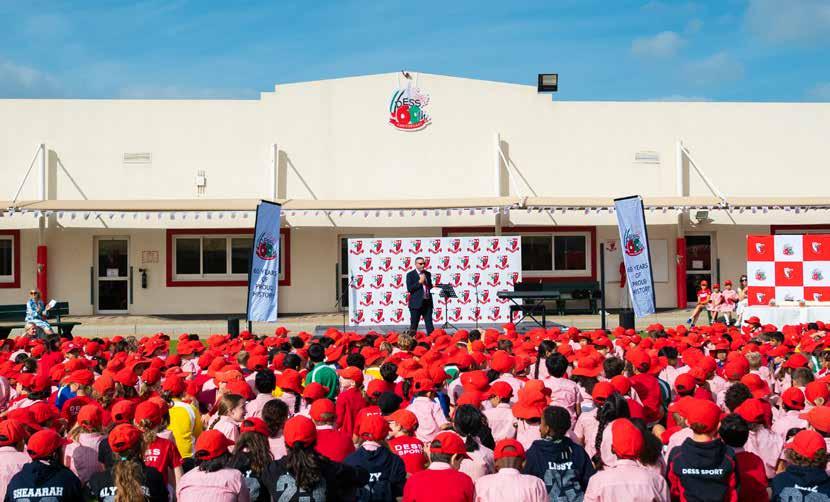
connection, tying our memories to the present. It is this connection that sees us have such dedicated support from our parents, without whom nothing would be possible.
From Movie Nights to Cocktail Parties, every part of our wonderful DESS community will be involved, not just in attending our anniversary celebrations but more importantly in the planning and execution of them. With teams of dedicated parents volunteering in every aspect, it is this coming together, this journey that we go on as a community which is vital in creating the ‘feeling’ that is so synonymous with DESS. Capturing and recreating a feeling is by no means an easy task, but with the involvement
of our close-knit community it is certainly something we can achieve together.

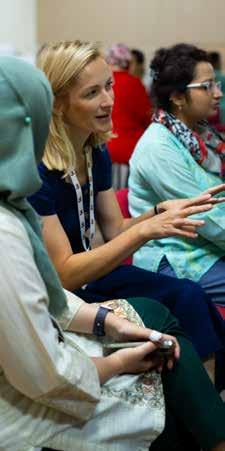
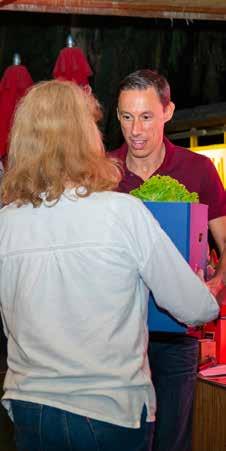
There were laughs aplenty, failed rocket launches, hidden singing talents and the unbeatable duo that is Clarkson & Lohe at the much anticipated and highly sought after DESS Quiz Night, our first social celebration. A roaring success, it was a throwback to DESS Quiz Nights of the past but also a catalyst for an abundance of new friendships
and memories. The fun had by all; parents, staff, trustees and alumni was plain to see, and the sense of community was nothing short of electric. Such an array of prizes available in our free prize draw showed the fantastic support we have from our wider community with more than half of those attending walking away with something other than the need to brush up on their 90’s music knowledge. To think that this was our first big, social celebration certainly left a big
smile on a lot of our faces.
With no concrete way to measure the success of events like these other than by the feeling it creates in people, the quiz showed itself to be a perfect baseline for how we hope to feel throughout all the celebrations across the rest of the year. The hype and excitement surrounding the upcoming events is palpable.

Our Outdoor Movie Night where we enjoyed a film as old and as fabulous as our school was a great addition to an already buzzing calendar and the 60th Fayre, where the children from Year 1 through to 6 showcased their hard work from the past term was a brilliant way for parents to see how our anniversary celebrations have been threaded throughout every aspect of the children’s learning. Even our events rolling into Term 3 are at full speed ahead. Our 60th Anniversary Iftar is going to be an evening not to be missed, with staff and parents pulling out all the stops for a truly memorable
evening involving all areas of our community.
It is community that has been embedded in our roots over the last 60 years and it is community that will continue to be, not only for the events that lie ahead this year, but for the next 60 years. By having this at the forefront of all our celebrations we will continue to nurture the ‘feeling’ that is so important. It is the time we spend together, collaborating with one another, building friendships and creating memories that is vital to ensuring our legacy lives on.

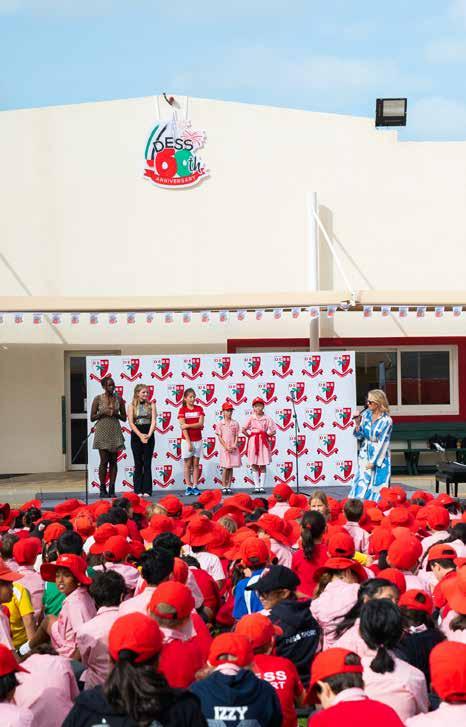
Whilst our memories of the sandy football pitch, blue castle, huge trees in the playground, shows and trips are magical, it is not these that DESS’s legacy is built upon. It is the emotional connection that is held so tightly by those of us who have been lucky enough to enter through its gates, the unquantifiable connection that can only be created by a sense of belonging. This is what makes DESS so special, this is what connects students, parents and teachers past and present and
what lays such strong foundations for the future.
If you would like to be involved in any of our up and coming events please do let us know. It may be that you have time to offer during the school day or maybe your company or business would like to sponsor or support one of the events scheduled. No time or amount is too little, every connection, every bit of help is truly appreciated and an integral part of what makes DESS, DESS!
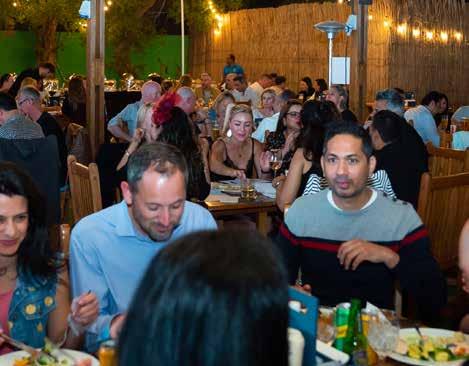
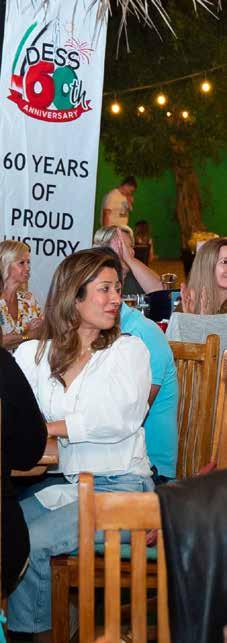

It is an appreciation of this ‘mode of style’ that we wanted our students to experience on the DESC Creative Arts Trip to Japan. So, in February 2023, 40 students from Years 10 to 13, accompanied by Ms Antoniou, Mr Kiely, Mrs Hilton and Mr Crabb headed east to the ‘land of the rising sun’ to immerse themselves in the unique culture and style of Japan.
Why is Japan called the ‘the land of the rising sun’? One might assume it is because Japan is the first country to see the rising sun. In Japanese, the country is called Nihon (Nippon). Both Nihon and Japan originate from the same words; they literally mean “where the sun rises”. The Japanese government changed the country’s name from ‘Wa’ (Yamato) to Nihon (Nippon) in the early eighth century. A point of note is that when naming the country, the Japanese took the Chinese government into consideration, possibly to show its esteem for the Chinese, as Japan is
located where the sun rises for the Chinese, not for the Japanese. Indeed, consideration for others and behavioural etiquette lie at the heart of Japanese culture and we noticed this immediately upon arrival in Tokyo, where airport staff greeted us with a bow, something we would soon learn is part of everyday life in Japan. Throughout our educational visit, we were gradually introduced to these formalities, with our tour guide providing both in depth explanations as well as teaching us the basic Japanese expressions used for greeting and thanking others. It was a pleasure to hear students greeting the bus driver every day with a hearty “ohayou gozaimasu” (good morning) or thanking restaurant staff after a meal with a sincere “arigato gozaimasu” (thank you).
History and tradition lie at the heart of cultural appreciation in Japan. During the visit, students had a diverse range of opportunities to experience Japanese art, craft, design, and architecture within a variety of contexts. A vivid contrast between tradition and modernity can often be found, particularly
in Tokyo. At the National Museum, students were able to see at first hand works by the early nineteenth century master printmaker Katsushika Hokusai, famous for his ‘Great Wave’, and gain an understanding of the lithographic process by creating their own print.
From the late nineteenth century onwards European artists such as Vincent Van Gogh found inspiration in the way the formal elements of line, shape and colour are handled in Japanese art. This is nowhere more evident than in the evolution of comic book art and animated cartoons in the 20th century. Students spent a morning learning about the basics of animation as well as the way in which the genre has evolved over the last century under the supervision of a master animator who has worked on many of the animations that they themselves enjoy watching. On their shopping and sightseeing expeditions, students revelled in the extent to which the ‘anime’ culture permeates everyday life, from the fashion sense of Japanese youth to the wild and colourful visual statements made by troupes of ‘cosplay’ characters posing for
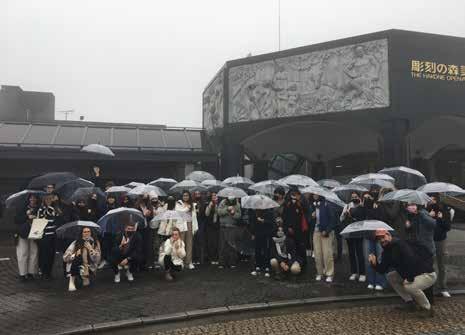
The whole of Japan is a pure invention. There is no such country, there are no such people …. The Japanese people are …. simply a mode of style, an exquisite fancy of art.
photographs in the city centre. Visits to the Yayoi Kusama Museum and also the Mori Art Museum challenged students’ perceptions and opened their eyes to the possibilities of what contemporary art can be through thought-provoking multimedia installations.
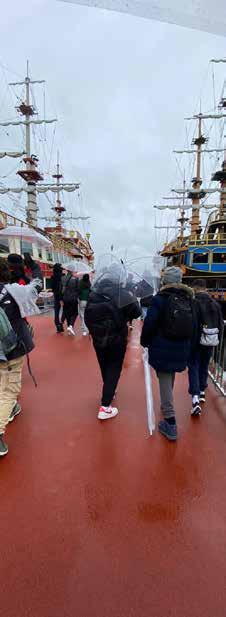

An awareness of technology and materials form an ever-present link between past and present in Japan. Our Design Technology students had the opportunity to visit the Kigumi Museum in Tokyo to investigate ancient Japanese wood construction techniques, in which no nails, screws, or glue are used. Students were able to see evidence of these construction methods at several shrines and temples during our visit, but none so breathtaking as the world famous Kiyomizudera Temple, built into a hillside above Kyoto where, as the sun set on the final afternoon of the trip, our students mingled with numerous local Japanese visitors many of whom wore traditional Japanese costume while performing ageold temple rituals in the stunning natural beauty of the setting.
An appreciation of nature and its relationship to everyday life is at the heart of all things Japanese, be it a kimono design, an immaculately kept zen garden or participation in the traditional Japanese tea ceremony which centres on the preparation, serving and drinking of ‘matcha’ (green tea) and embodies meditative spirituality.

Throughout the trip we developed an awareness of the way in which nature, tradition, ritual and design
are so closely and deeply interwoven in Japan. Even mealtimes revealed the careful consideration that is given to the presentation of food, particularly in traditional Japanese cuisine. From the outset of our time in Japan we endeavoured to become familiar with the art of eating with chopsticks, one of the key elements of Japanese etiquette, and became more confident with daily practice. As well as savouring world famous dishes such as sushi, students had much enjoyment in cooking their own food either on the tabletop BBQ or steam pot – preparing dishes such as sukiyaki and okonomiyaki, and by doing so generated a truly communal dining atmosphere.
In summary, this was a truly amazing opportunity for DESC students to experience a culture and way of life that is so very unique and to develop a deeper awareness of visual style and aesthetics. As the plane took off into the night from Osaka’s Kansai airport, we were able to reflect on the many memorable moments created during our week in Japan and to wonder when we might next have the opportunity to return to the land of the rising sun.
 Sophie McLean | Marketing & Communications Manager, DESS
Sophie McLean | Marketing & Communications Manager, DESS
The UK’s prestigious Exeter University has much to brag about.
A Sunday Times University of the Year, it has cultivated BAFTA winning actors, a handful of Olympians, three rock stars, two British Lions rugby players, fours Royals and six England cricketers.
It also gave DESS Harry Atkinson.
When he spotted a handwritten teaching job vacancy pinned to one of the University’s notice boards in mid 1964, his first thoughts were ‘why not?’ and ‘where’s that?’. Though he’d never set foot outside Europe, the 21 year old’s curiosity and sense of adventure took hold and within a few months he’d sailed through a job interview and was on his way to becoming the first Headteacher at Dubai’s first British school.
“When I landed in Sharjah, the
place was deserted but for a few members of airport staff,” said Harry. “They said I needed to get a taxi to Dubai and that the journey would take either one or two hours depending on the tide!”
One minor detail that the job advert had failed to include was that the ‘new’ school hadn’t actually been built.
“When I arrived, the first job was less to do with academia and more to do with mixing cement and laying bricks,” he said. “Everyone just chipped in and we were ready to open on October 3rd. By that point the school had already been operating in a three-story property for a year and its 10 pupils were being taught by Flight Lt Freddie Luffman from the Royal Air Force Educational Corps together with a handful of volunteering parents. Word of our plans quickly spread and by the time we opened there were 24 pupils in the new school
building.
“I couldn’t even find Dubai on my atlas before I left, but when I got there, I do remember feeling a general sense that something amazing was going to happen and that Dubai was really going somewhere. I think that premonition prevailed from the outset and was most likely what prompted the parents to start a school in the first place. I think everyone was infected by the passion of those first DESS parents.”
I couldn’t even find Dubai on my atlas back then.
Swimming wasn’t always Roy Meuleman’s thing.
But when it dawned on him that however slow he was in the pool, he’d still lap everyone who was sat on the couch, his will to win took over.
Within a year he’d been appointed swim captain and had set a DESS school record for the butterfly that still stands today; 40 years later.
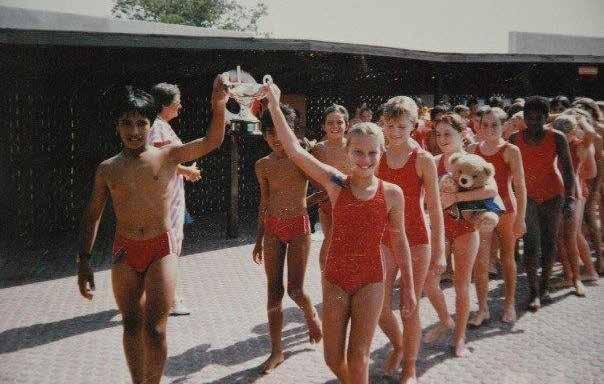
“I remember the first time I got into the pool for a swimming session during PE,” said Roy; whose brother Nimrod had joined DESS two years previously. “I couldn’t work out
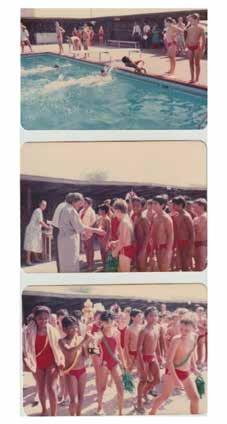
“whether I wasn’t very good – or was just lazy. Then one day I turned up and decided I wanted to swim and win. And everything changed from then.
“Given the scope and scale of DESS in the early ‘80s and the fact that Dubai itself was just a village back then, it wasn’t hard for a tight-knit community feel to develop and for parents and kids to interact closely during and after school. What’s really amazing is that the same qualities, charm, and down-to-earth atmosphere prevail today, which is why I’m so delighted that my own children; Gabrielle and Dylan, are experiencing them.”
One day I turned up and decided I wanted to swim and win.
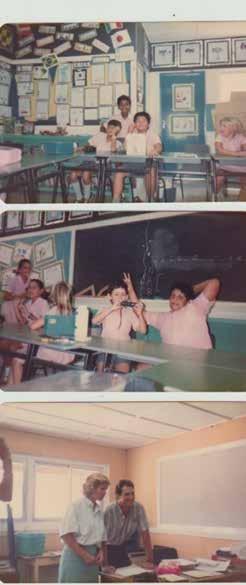
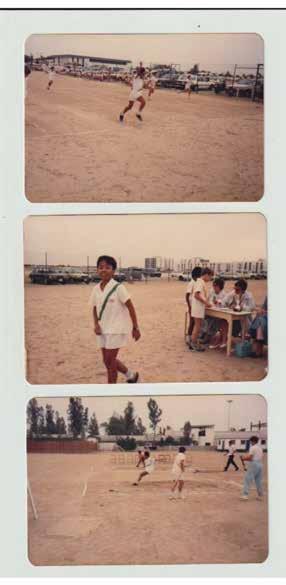
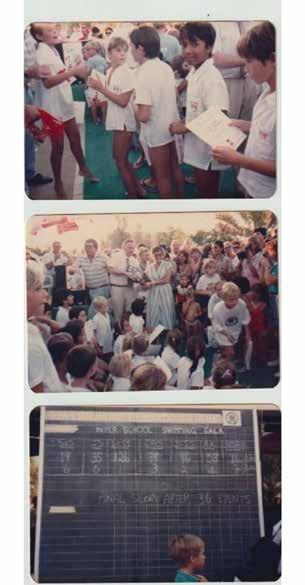

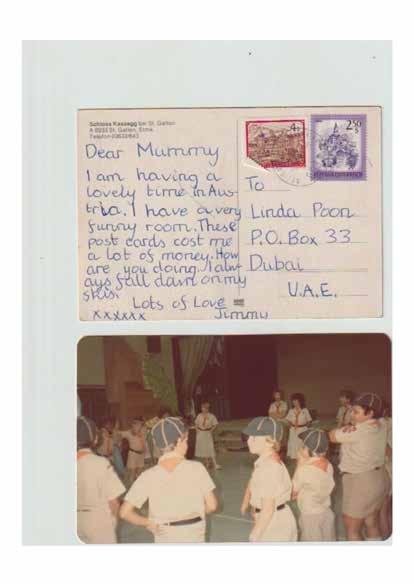
Linda Poon was taken back to the future when her 6-yearold granddaughter Kayla started at DESS in 2020.
Just when she thought the school runs for son Jimmy, that had filled her mornings and afternoons back in the ‘80s, were destined to remain no more than a precious memory, she was delighted to be given a chance to relive the experience.

“They were truly special times that seemed to pass in the blink of an eye,” said Linda. “Getting another opportunity to hear about Kayla’s magical DESS moments at the end of each day on the journey home from school, is a very special treat
that I never thought I’d get.” For Jimmy himself, DESS was fabulous, formative - and all about friendships; among the longeststanding of which has been with classmate Sam Cordier, who has remained a great friend since and was Jimmy’s Best Man.
For everyone who was at DESS in 1987, one of that year’s most memorable events was the visit by Princess Anne.
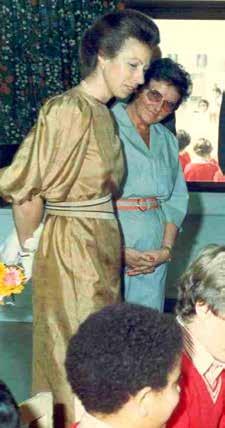
“I remember dashing along a corridor and hitting my hand on a wall-mounted fire extinguisher,” added Jimmy. “I had it bandaged just in time for the Royal visit. Having spent weeks praying that
Princess Anne would come to me to shake hands, I suddenly found myself praying that she wouldn’t!
“In a sense, it’s difficult to find the words to adequately sum up what DESS meant to me. My life’s most formative experiences have been getting married, having my first child – and then getting an offer to send her to DESS! It was such an amazing experience. In fact, it was so good that I wish I’d been able to do it later in life! What I particularly love is that while it’s clear that DESS has added, expanded, and improved on what was already a positive learning experience, it has done so without losing the core essence and character of the school itself.”
It was such an amazing experience. In fact, it was so good that I wish I’d been able to do it later in life!

The difference between rewards and awards is that awards mostly involve an extrinsic presentation of a physical commendation, whereas rewards involve an acknowledgment or token of appreciation. To help teenagers to flourish, both rewards and awards need to be presented to them, allowing them to develop their own internal targets and a personal sense of individual accomplishment. It is important that young people learn that they cannot always rely on others and that they have the opportunity to experience a sense of pride when they achieve something by themselves.
Bearing this in mind, celebrating students is something that we strongly believe should be at the centre of our practice as teachers. When students join us here at DESC, our sole intention is to facilitate them on their individual journeys, making sure that every student makes progress within their own abilities and interests. For staff at DESC to help students fulfil their potential, overcome the bumps in the road and rebound from any temporary setback, we strive to use rewards and awards concurrently. We do this in the hope that, through guidance, consequences and recognition of any kind, our students will grow into young adults who live a fulfilled life, with an understanding of how to be the best version of themselves.
Celebrating students at DESC is a carefully considered process that allows staff to recognise students based upon their progress, attainment, values and character. Through these four strands, we aim to build well

rounded students who develop a sense of grit, determination, kindness, self–awareness and social responsibility. Our DESC celebration programme is designed to create opportunities for all students to be recognised, regardless of their abilities, skills, or interests. Various staff members have an input at different times of the year to make decisions about why students are deserving of recognition and the reasons why they feel this is
necessary. From classroom teachers, to tutors, the Sixth Form Team and Heads of House, much of the recognition at DESC is decided and discussed between staff across the community.
Character rewards are logged by classroom teachers and other staff around the College on a daily basis.
These rewards stem from Martin Seligman’s focus on character strengths and his positive psychology research that outlines just how important it is for all of us to have a comprehensive understanding of our character. Therefore, when staff see fit, they are able to reward students using the character strengths as a title, based upon what students have displayed or embodied. Students are made aware through positive conversations with their teachers and tutors.
So far this year, more than 17,500 character rewards have been logged by staff, celebrating all 24 of the character strengths that we focus upon. Amongst the rewards logged, most notable are character strengths such as love of learning, kindness, and tolerance.



The DESC House Awards have become synonymous with the House System, allowing Tutors and the House Team an opportunity to regularly celebrate student success from Years 7 to 13. By success, we do not mean just academics, but rather, success in being all-round fantastic human beings. Whilst celebrating student character has always been a high priority here at DESC, in the past four years we have streamlined our
rewards system to the point where we feel students are regularly and appropriately recognised for their resilience, perseverance, kindness and all the other core values which we wish to see in every DESC student. The purpose of the House Awards is to ensure students understand the importance of being kind, respectful, hardworking and resilient. At the end of each half term, tutors nominate one student per tutor group to be presented with a House Award. Students can be nominated for many reasons, but they all have one thing in common - they have been highlighted for being the best version of themselves. Desert Demeanour, Earth Ethos, Sky Stars and Coast Culture truly have become symbols of excellence, with students receiving a certificate and a trophy for them to take home to their family to continue the celebrations.

Every half term, teachers nominate one person per year group, per subject to win their subject award. The awards are based upon the subject content, an inspiration within that topic or the skills and attributes one needs to do well within the subject area. Award titles include the Arabic Falcon Award, Young Lawyer Award and The Zimbardo Award – to name a few. The awards are emailed to parents, along with a paragraph that explains their accolade. Students are then awarded within lessons through the presentation of certificates, celebrated online and also invited to other opportunities such as pizza lunches and breakfast celebrations.
Each half term, when combined with Pastoral Awards, more than 15% of all DESC students are celebrated formally from Years 7 to 13.
Student of the Term is awarded termly to 6 students within the entire student body. Decided by Heads of House and Heads of Sixth Form, this award is given to students who they feel encapsulate what it is to be a DESC student. This award to given to those who embrace the opportunities within the DESC community and invite others to do the same. More often than not, this award is given to those who work hard to try new things, push themselves outside of their comfort zone and continually work hard to develop rapport with both students and staff alike.
Through the academic year, this award is given to 18 students, constituting 1% of our DESC community. We celebrate those students within House or Sixth Form assemblies by presenting them with a voucher and personal celebratory citation.

Prize Day takes place during the last few weeks of term and is the culmination of all celebrations throughout the year. Placed within the DESC calendar during study leave, this is a whole community event that involves students, staff, parents, and stakeholders. Throughout the formal ceremony, students in Years 7 to 10 are awarded for their progress, attainment, character and values.
Led by their Head of House, students and parents are invited to celebrate student achievement throughout the year and enjoy a plethora of performances throughout the ceremony. Students are invited to the stage to collect their medals, having the ability to win three


medals within the ceremony. During our Prize Day celebrations, 61% of all students are recognised formally, however, all students spend the day reflecting and celebrating on their accomplishments that year.
Finally, two students are the honorary winners of the David May and Bill Duff awards each year. These are awarded by our Principal, Andrew Gibbs and Headteacher, Christopher Vizzard. The most notable and selective awards, these accolades are named after two of DESC’s inspirational founders. The students who win these awards always have their own stories, usually ones that depict a young adult who has worked with tenacity, courage and curiosity to get to where they are today.
When combined, every student at DESC has the opportunity to be celebrated. After all, each student has their own strengths and weaknesses – an original person with their own dreams and aspirations.
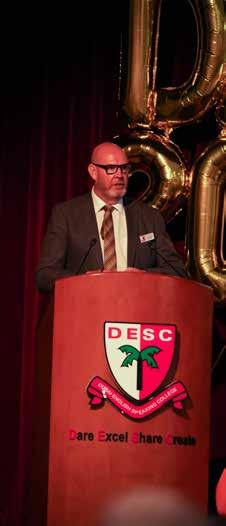
There’s no point in dwelling on the past because all that matters is the future. Said no-one, ever.
Well, no-one with an ounce of insight and sentimentality, anyway. Sure, this crazy fast-changing world sometimes leaves us with precious little time for nostalgia.
But the day we become a school with no appetite for recording our history is the sad day that we’ll miss a vital truth, namely that a sophisticated understanding of our past is one of the most powerful tools we have for shaping our future.
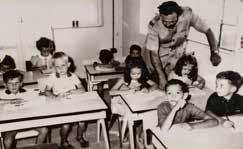
That’s not to say we need to be a slave to our history. But it does mean that we must recognise its influence and might. Time will be our ultimate critic and DESS’s hoard of experiences, evolving culture and credentials, astonishing prominence within the broader context of Dubai’s education landscape and its relationships with stakeholders, all conspire to shape the choices its leaders make about its future.
As we celebrate the considerable
achievement of being Dubai’s oldest British school, we may not necessarily see ourselves as historians. But boy, do we love to think and talk about the rich stories that define our past. And that’s why we need a history book. Not a dreary, humdrum chronicle that we’ll flick through and then condemn to a cabinet.
But a big, bold, vibrant, faithful collection of cherished tear-jerking memories with an indomitable lifeforce that prevents it from ever losing its slot in the centre of the coffee table.
So that’s what we’re producing.
Students, alumni, parents and teachers past and present, Trustees and local historians. Dozens of interviews, hundreds of pictures and thousands of reflections, tributes and celebrations.
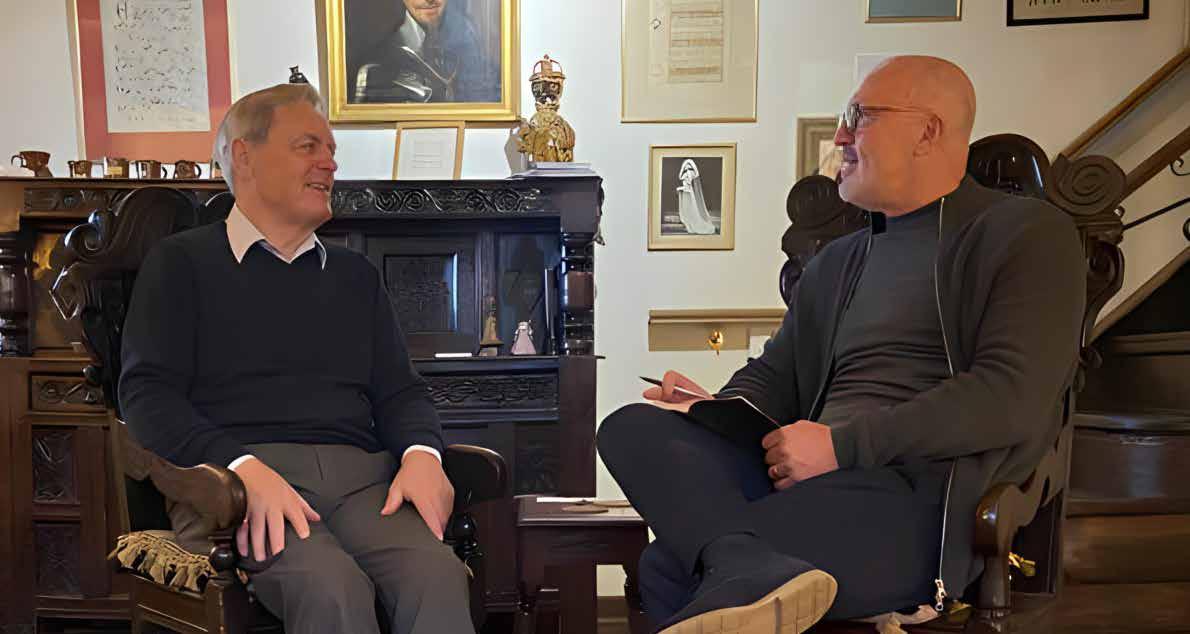
We deserve a chance to say this is where we’ve been, this is where we are and this is why we’re here. From there we can decide where we must go.
The great historian Carl Becker said our past is a screen upon which we project our vision of the future and our need for change.
Let’s prove him right.
Celebration is a form of psychological nourishment and it is vitally important for our health, happiness and well-being.
Studies have shown the significant benefits of celebration including improved physical health and better coping strategies. Research indicates that people who take the time to reflect on and celebrate their successes and achievements are more optimistic, take better care of themselves and tend to be less stressed.
The wealth of research emphasising the importance of celebration means that in Psychology, it is an integral part of our departmental approach to teaching and learning here at DESC.
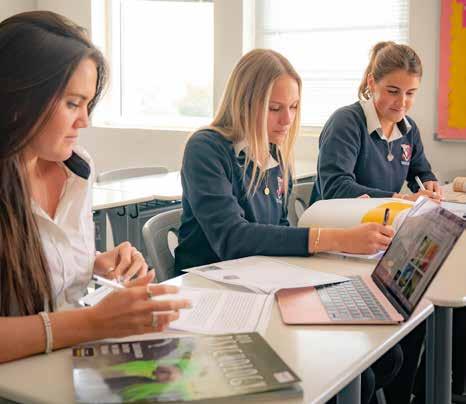
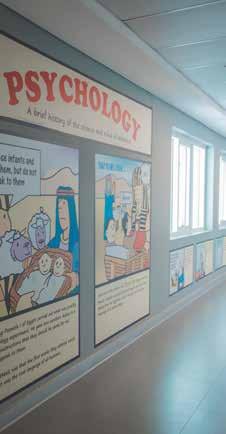
Celebrations of learning feature our psychology students as the communicators as they are front and centre in articulating their knowledge. In class, processes to do so include designing research for their peers to participate in. The winning groups success in designing an appropriate, practical and feasible study can then celebrated by conducting it within lesson.
Outside of lessons, passion for psychology is celebrated and articulated through PsychSoc in which our A level students have the scope to investigate and present to their peers focusing on specific areas of choice. The students are engaged, supportive and adept in their positive reception of one another’s work. We also encourage our Key Stage 4 students to apply their learning outside the classroom
through house competitions. For example, our Year 10’s are involved in a competition to produce a photograph or piece of artwork which encompasses four monocular depth cues. This celebrates the knowledge they have gained in the topic perception and endorses competition, application of learning, resilience and celebration of one another and their individual talents.
Finally, we celebrate individual students through our distribution of the ‘Zimbardo Award’. This celebrates the enthusiasm, determination, dedication and success reflected in attainment of students in Psychology. We recognise the significance of celebration in our students’ learning journey and are committed to embedding this ethos within Psychology.
With another record-breaking year of university applications, this article celebrates two students heading to two prestigious establishments, in two very different corners of the globe!
Each year, DESC sends students all over the world to advance their education. This year, the Higher Education Department processed 175 UK applications, 29 US applications, 12 European applications and a handful of others to bespoke institutes.
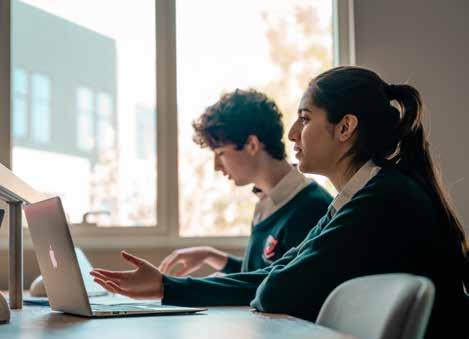

Amongst these applications were one to Oxford from Elisabeth Freeman and one to Stanford from Myra Kirmani. Both students had set their sights high. Both students knew the incredibly small chance of acceptance. Both students are now celebrating with offers in their hands to two of the most notable universities in the world.
Getting into Stanford has been my dream since visiting the campus when I was just eleven years old. The amazing facilities coupled with Stanford’s incredible reputation and location meant that it was my number one choice. Specifically, the culture of the university really drew me in – it seemed like a place where you could learn from the best in the world whilst really having fun and enjoying your college years. I can’t wait to spend the next four years there!
I plan to study Economics and Maths with a minor in Education, but I do hope to explore some other subjects; luckily, US universities give you that flexibility. I am passionate about achieving equitable education for young people in disadvantaged areas, and my studies will be aimed at working towards this goal. Coming from Kashmir to Dubai in Year 8 was truly momentous; having experienced sporadic and limited schooling there, I value education enormously and want to do something to ensure that more people across the world have access to a full, vibrant and diverse education, something I have been lucky to have.
Too much, honestly. I am extremely grateful to all my teachers and friends at DESC. From Mrs Ford’s and Miss Taylor’s beautiful letters of recommendation and guidance on essays from Mr Burke and Mr Flynn (along with daily philosophical conversations!), to my friends who were up with me at 3am to open my decision letter, the support from everyone was endless. Within my subjects, Mr Patton’s expert teaching of Mathematics unlocked my passion for the subject and his anecdote on calculus and ‘cheese’ even made it into one of my Stanford essays!
As someone passionate about learning, the world-renowned education system and expert academics at Oxford always awed me. I dreamed of being able to pursue my studies in such a stimulating and history-rich institution. Add this to the idyllic town in which I could be living, and I was sold! I simply had to apply.
I intend to read History at Exeter College as the subject fascinates me, has made me a more critical and perceptive individual and has helped
me understand the complexities of the world around me. As the oldest English-speaking university in the world, I’m overjoyed that I will be able to pursue my love for history at the University of Oxford.
From Mr. Burke’s continuous support and insight into writing my personal statement, preparing for the admissions test and the interview, to Miss McWhirter’s and Miss Byrne’s passionate teaching of History, their endless support and faith in me and the kindness and support of my form tutor Miss Hunt; suffice to say, I never felt alone in the entire application process, for which I am very grateful to the College.
The best way I have found to revise for any subject is using active recall and spaced repetition. And for essay subjects, make sure you read widely and build a solid foundational understanding of your texts or areas of study. Nonetheless, I always try to make time for exercise and nonacademic activities to look after my mental and physical health, whether this be walking my dog, playing piano or catching up with friends; I know I only perform my best when I feel my best.
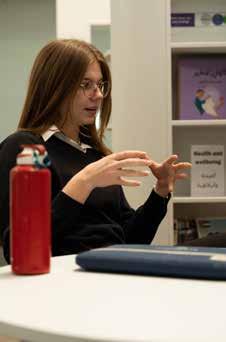
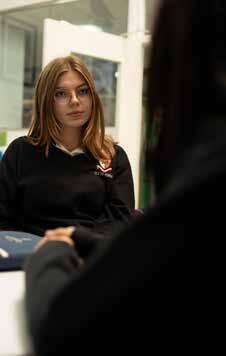
Don’t doubt your abilities. I very nearly talked myself out of applying as I was sure I wouldn’t be successful competing against thousands of brilliant applicants. However, I knew I would regret not having tried, and I sure am glad I gave it a shot now! Also, be yourself. What will make you stand out is your personality and passion for the subject, so if you are fascinated by a lesser-known area of study, let that shine through! There is no archetypal ‘ideal Oxbridge applicant’ role to replicate and chances are tutors wouldn’t be very impressed by inauthenticity.
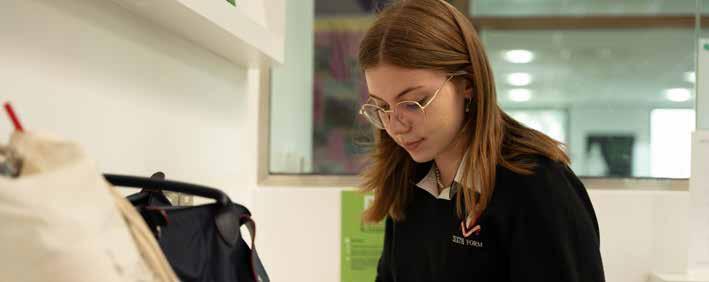

At DESS, I am proud to be part of a community that celebrates diversity in all its forms. With children from 57 different countries, DESS is a true melting pot of cultures, beliefs and languages. It is a place where we are all encouraged to embrace our individuality and respect the differences of others.

International schools are known for their diverse populations, representing a mix of cultures, nationalities and life experiences. This diversity is one of the key features that make these schools unique and attractive to families. However, diversity is not just about numbers or representation. It’s about creating a learning environment where all children feel valued, respected and accepted for who they are. This requires intentional efforts from schools, teachers, children and their families
to celebrate diversity and promote inclusion.
DESS is at the forefront of this effort. We recognise the importance of fostering a sense of belonging and community among our children. We provide a highquality education while promoting the values of respect, tolerance and understanding. It is a place where children learn to interact with, and understand people from, different backgrounds, cultures and perspectives.

The value of celebrating diversity in DESS is essential to helping our children become more tolerant and open-minded citizens. When you think about celebrating diversity at DESS, many will think of our annual International Day. This event showcases the diverse cultures and traditions of our community, with performances, food and
activities that highlight the unique experiences of our children and bring everyone together. However, the first step is to create a learning environment that is welcoming and accepting of all, regardless of race, ethnicity, gender or religious beliefs.
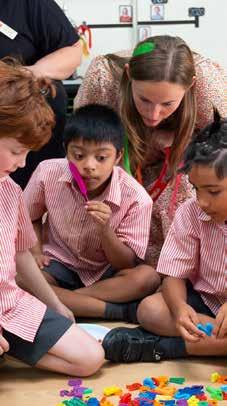
Another way DESS celebrates diversity is through its inclusive curriculum. The school recognises that diversity is not just about skin colour or nationality but also about learning styles, abilities and interests. The school’s inclusive curriculum is designed to accommodate the needs of all and provides opportunities for children to learn about different cultures, beliefs and perspectives. This helps to develop a broader understanding of the world and fosters a sense of respect for others.
Teachers also play a critical role in
promoting diversity and inclusion. DESS provides professional development opportunities for teachers to help them understand and address diversity in the classroom. Teachers are encouraged to incorporate diverse perspectives and experiences into their lessons and to create an inclusive learning environment.
DESS, with its diverse student body, inclusive curriculum and commitment to promoting diversity and inclusion, is an excellent example of how international schools can create a community that celebrates diversity and foster a sense of belonging for all.
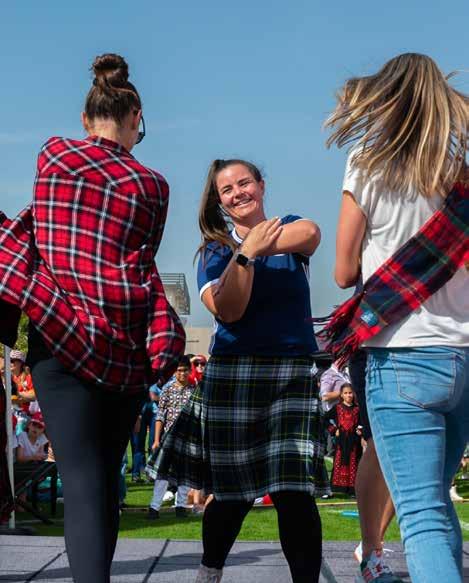
In today’s rapidly changing world, it’s more important than ever to celebrate diversity and promote inclusion. By creating a learning environment where all students feel valued and respected, we can help children develop a deeper understanding of the world and the diverse perspectives and experiences that shape it. This will not only prepare children for the challenges of a rapidly changing world but also equip them with the skills to become responsible global citizens.
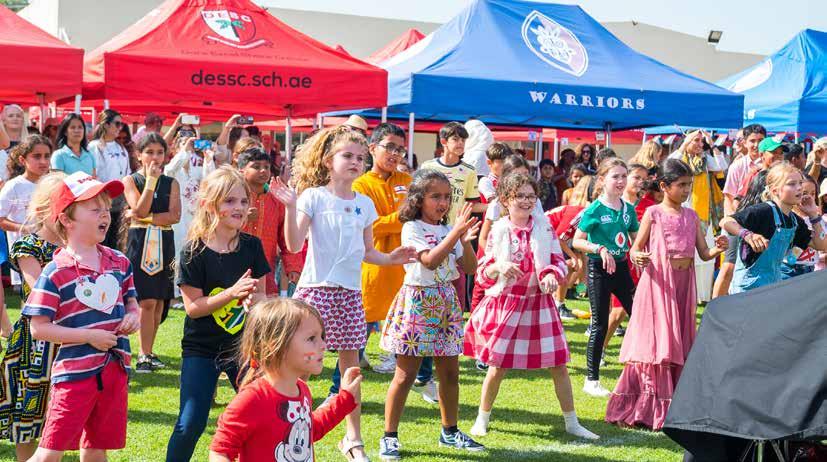
Iam delighted to share with you the fantastic news that DESC are the recipients of the BTEC International Institution of the Year 2022 Silver Award. This coveted annual award considers nominees from international education institutions across the globe, including further education providers of BTEC vocational courses to beyond school-aged students. Therefore, we are incredibly proud to have received this award as it provides affirmation of the strength of our vocational education provision here at the College. From its introduction in 2015 with just two BTEC courses, our vocational offering has grown to eight subjects, including two RSL (Rockschool) Performing Arts qualifications. The popularity of these courses amongst the student body has grown exponentially, and we now have over a quarter of all Sixth Form students following a vocational pathway. This makes our vocational provision the largest
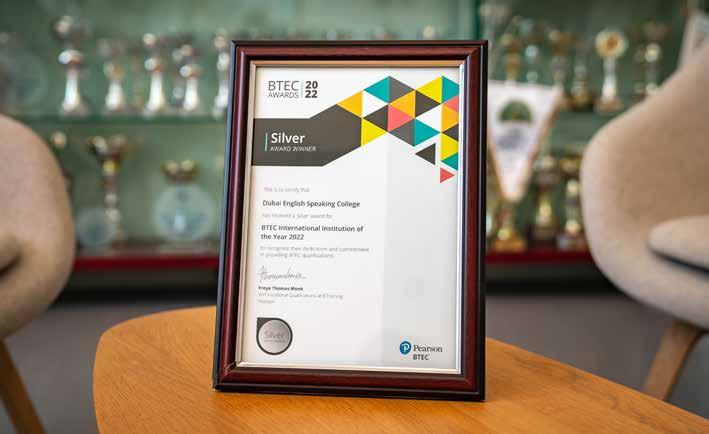
in the Middle East in a British Curriculum setting, both in terms of breadth of courses available and student uptake.
I passionately believe that there are two stakeholder groups that have contributed to the success of DESC Vocational: our students and staff. It has been incredibly rewarding to observe so many of our Sixth Form students flourish on our vocational pathway; the practical nature of these courses is better suited to some of our students and they prefer the ‘hands on’ practical nature of the work-related assignments they complete as part of their coursework. This is always reflected in our truly exceptional results. However, this was exemplified in the results of our most recent cohort. 85% of all students achieved a Distinction grade (or higher), which is equivalent to an A grade (or A*) at A Level. Our specialist staff deliver these courses with great enthusiasm and expertise,
and provide exciting opportunities to contextualise students’ learning through vocational ‘Exceptional Experiences’, including: field trips, guest speakers and practical collegebased work-related activities.
These opportunities ‘bring the learning to life’ and allow the students to recognise the practical benefit of what they are learning. This award consequently feels like a recognition of the first-class delivery of BTEC at the College as a leading vocational centre. In addition, to have this recognised in addition to the Which School Advisor award for ‘Best UAE School for Technical/Vocational Education’ is further confirmation of the quality of our provision. This ongoing success is the culmination of a team effort, and I would like to take the opportunity to relay my sincerest gratitude to all those who have contributed towards our vocational provision and helped to secure this prestigious award.
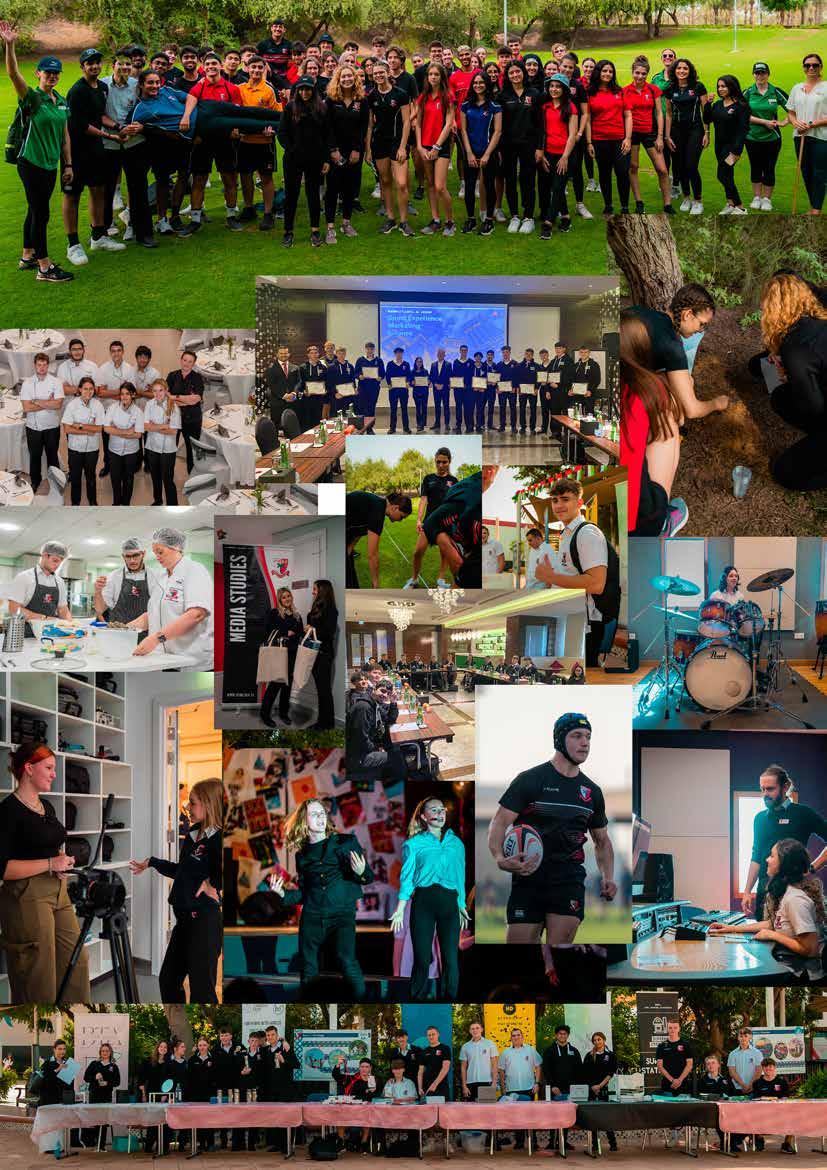
I am currently the CEO of National Bank of Fujairah (NBF) and have been since the end of 2009. Prior to that I had worked in the UAE for Barclays during 1988-91 and 19982003, with roles in London, Qatar and Singapore in between these dates.
I am the proud father of five children, all of whom have had at least part of their education in DESS and/or DESC over the years since 1998. Each time we looked at the education options available to us throughout this period, DESSC was always on the initial wish list and, spaces permitting, always went on to become our preferred option.
During this time and through a number of business relationships with members of the Board of Trustees, I became aware of the structure of the school and the way the operations of the school and it’s not-for-profit status was governed.

The Board positions have a limited tenure so there is a regular opportunity to bring new people and insights to the discussions and the oversight responsibility. I was initially approached by the previous Chair, Cynthia Trench, at a social event to consider putting myself forward for a role on the Board. Following the initial informal approach, I went through several selection interviews and joined at the outset as a Trustee “in waiting” for a short period of induction.
From before my time, Board members have tried to establish a spread of professional competencies amongst the membership so that we can provide practical advice and knowledge across the fall gamut of the school’s operations. As you might imagine I was positioned to replace one or two of the earlier members that had a strong finance background.
My appointment to the position of
Chair (now President) was triggered by Cynthia coming to the end of the maximum tenure allowed under the schools’ Articles of Association and involved a vote amongst the full Board. Of course, it was a great honour to be considered for the role and I hope they still feel happy with their choice!
Fortunately, the Board is full of people driven by a strong commitment to a common cause, i.e. doing what we believe to be in the best interests of the institution, and each member gives their significant time and effort on an unpaid basis. So, despite the weight of responsibility that no doubt comes with the role, it is a pleasure to work with such a group and to interact with the school’s senior leadership team, who day after day clearly demonstrate their undoubted ability and dedication.
What are the most rewarding parts of your role?
That’s easy – these often come when I can get away from the day job and join one of the many events that
take place at the School or College. Now that I am no longer focused on the participation of my own kids, I can really appreciate the breadth of the activities underway each term and the quality of the end product, whether it be from a performing arts production, a sporting fixture, the photography competition, the singing of the Chamber Choir or any of the other amazing events that I have been lucky to see.
In this early post-pandemic period, I should also mention that being able to witness the joy on our students’ faces on their return to school after this prolonged period of disruption, made all the hard work behind the scenes totally worthwhile. Then, of course, there is always the unbounded joy of the children at DESS with almost everything they get to do, to lighten the load of any of my own day-to-day concerns.
Finally, the greatest reward comes from seeing the quality of the young adults that have passed through DESC and go on to bigger and brighter futures. At the end of the day, providing the environment that allows our students to achieve and to benefit from the opportunities in front of them is what we should strive to do every day.

I heard just before Christmas last year and was quite taken aback. I have learnt subsequently that to be considered for such an honour, someone has to take the trouble to nominate an individual, who is then assessed and vetted through a number of selection bodies. So aside from the award itself, which is very special, I was particularly taken by the idea that someone had taken some significant effort to nominate me and to successfully navigate the selection process.
There is a little formality around the acceptance process and then the next step is the formal public announcement in the New Year’s Honours List. This caused tremendous excitement amongst the Cook household and many hours were spent seeing who could spot my name first. Not all of the UK Press publish the list in full but the first one available online was the Manchester Evening News! As you can imagine, I now have a house in the UK full of newspapers from that day. The next occasion will be the formal investiture that will take place in the coming months.
What did you receive it for? And did you even know it was a possibility?
Unlike at school, you do not get a year-end report or the result of an examination, so I have to make some assumptions here and no, it was not something I had ever really thought about. The formal announcement advises the award was in recognition of “service to UK/UAE business relations and the British community in Dubai”.
I have been involved in supporting the development of UK/UAE business relations since I first came to Dubai in 1988, being a long-term member of the British Business Group and previously a member of the Dubai-UK Trade & Economic Council and aside from my day job, currently have a number of nonexecutive roles that continue this work. Aside from my role at DESSC, I am also the Treasurer and a Trustee of the British Community Assistance Fund, which is a charitable endeavor founded in 1986 to assist British nationals who find themselves in difficulty, for whatever reason, in Dubai and the Northern Emirates. The fund has directly helped over 2000 individuals, and many more indirectly, since its inception and works very closely with the British Embassy.
What advice would you give your younger self?
Take time and sit still long enough to enjoy what you have around you. Not to worry so much – very rarely do things turn out worse than your own fears will predict – it is better to take a step forward than forever wonder what might have been. Stay true to your values and always remember success will come through how you are able to work with others not how smart you think you are.
What would be your one wish for DESSC in the future?
That the next 60 years will be as full of accomplishments and significant achievement as the first 60, and that the bond between the schools and its community of students, parents, staff, management and Board continues to develop and flourish.
At DESC, we place an emphasis on Character Development through a variety of avenues. Special consideration towards Character Development is conducted through our Character Conversations.
Character Conversations take place three times a year, and are an opportunity for Tutors to have (one-to-one) conversations with the students in order to celebrate, recognise and reinforce positive behaviour.
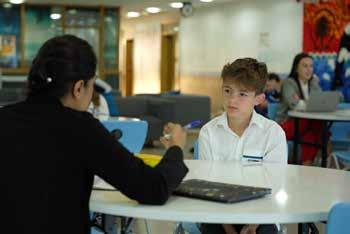
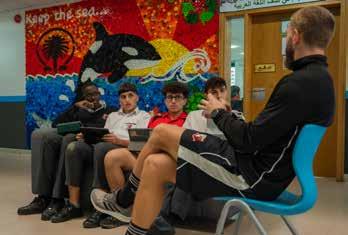
Celebrating Character Development through conversation, we believe, encourages continued growth and improvement, builds self-esteem and confidence and promotes and celebrates a positive school culture. We believe at DESC that Character Development lays foundations for
future success and happiness and celebrating it fosters a sense of accomplishment and pride. Alongside providing opportunities for self-reflection and growth through conversation, we also acknowledge, reward and celebrate positive behaviour from our students. We strongly believe good character is essential for success in personal and professional relationships, it promotes ethical behaviour and encourages individuals to make good decisions. We reward good character through our online rewards system; when staff witness excellent character, they log their observations and as a House team we celebrate the student’s success.
Finally, at DESC we offer a variety of leadership roles within the House system. Our House Leadership team is a celebration of its own, as we
are lucky enough to have student leaders who exhibit excellent character traits such as integrity, responsibility and empathy at all times. Our leaders inspire and positively influence their peers and students in their House, whilst promoting positive relationships and social skills which prepare them for future challenges and responsibilities. Our House Leaders are excellent role models and we are proud that they all contribute to building a safe, positive and supportive environment.
Celebrating Character fosters a sense of pride and accomplishment. It is a focus point for us all as we recognise the imperative role it plays in developing integrity and positive values amongst our students at DESC.
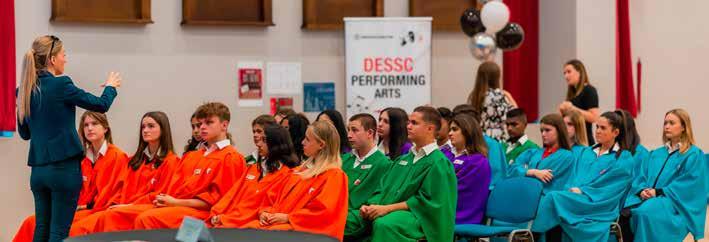
The world is a beautiful, complex, integrated marvel. One of our aims as a Geography Department is to help students to truly explore the wonders of our world and, through the curriculum, we celebrate the role of the physical processes shaping the planet as well as the human developments which create distinct environments.
The Geography Department are therefore very excited to see the return of fieldwork. Fieldwork is an integral part of the curriculum with the Geographical Association describing it as enabling students to better understand the “messiness of geographical reality.”



In Year 8, for example, students have been able to celebrate the role that the sea plays in shaping the world with a visit to the beach. The
students experienced a variety of Human and Physical data collection methods to explore the coastline. We paused to see the beauty of the area and tried to capture this in a photograph and sketch of the landscape.
Year 11 have perhaps benefitted the most from the return of fieldwork. This is a compulsory element of the GCSE course, with students required to participate in two days of fieldwork. Year 11 students have explored the city to see if Dubai has developed in line with Burgess’ Urban Model, collecting data to enable them to reach substantiated conclusions on the topic. Our second fieldwork day explored in more depth the physical processes shaping the coast to answer the question ‘Are Dubai’s beaches well managed?’. Following our fieldwork studies, Year 11 have been able to celebrate the completion of the taught subject content for their course and now turn their attention to revision.
The beauty of Geography is we can see it wherever we look. We encourage the students to find the evidence outside the classroom during their travels, celebrating the wonder and uniqueness of places and allowing Geography to come alive. Happy exploring!
Let’s imagine that the tree in this photo can speak out and ask you the following questions:
What do you think my name is?
Where is my homeland?
What do I stand for and why am I planted in front of Sky House Block at Dubai English Speaking College?
I am sure that you have seen this tree on the side of the road or during one of your winter camping adventures out in the desert. It is called the ‘Ghaf tree’, one of the most important species in the Arabian Peninsula and particularly in the United Arab Emirates.
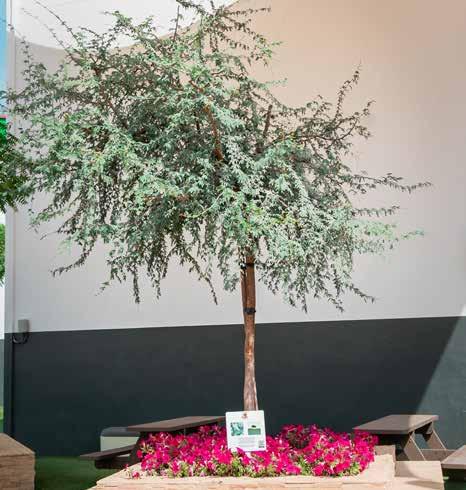
The Ghaf tree, also known as the tree of life, has a very prestigious place in the history and culture of the UAE; it is considered as the UAE National tree and has been used in various aspects of daily life such as for shade, firewood and medicine. Given the significant role the Ghaf tree has played in shaping the country’s drive for sustainable development, we planted it on our grounds, in front of Sky House Block, to reflect our commitment to the celebration of both the culture and vision of our host country, the place that we all call ‘A Home Away from Home’.
At the College, we pride ourselves in being meticulously attuned to the culture of the UAE. We promote local culture and heritage in many ways to help our students learn more about the country’s rich traditions and values and thus encourage them to become
Hani El Taher | Assistant Headteacher, DESC
culturally diverse. Our relentless drive to build the character of the young people in our care requires a strong focus when exposing them to culturally rich and enlightening experiences and it goes without saying that those experiences are inspired by the values that the UAE represents. This is what we refer to as the ‘DESC way’ when promoting the culture of the UAE.
Flag Day and National Day are the key events in the calendar that we eagerly look forward to celebrating every year. The operational aspects of these two days are brilliantly led by our student body. We encourage our students to be a central part of the planning and delivery of these incredibly important cultural markers in the DESC calendar. It will take you no time at all to
recognise the extent to which our students – regardless of cultural and national heritage – feel genuinely ‘Emirati’ when participating in these events. Whether that is from wearing Emirati attire, dressing in clothes representing the colours of the UAE flag, waiting for their turn to taste the traditional food or decorating their hands with Henna, you immediately feel the sense of belonging that they have acquired. No matter how many years the students have been at the College, the excitement and joy that these events continually generate shows the imperative role that we all play - as parents and educators –in creating outgoing, tolerant and global citizens who are open to accepting and embracing different cultures.
The DESC Arabic and Islamic curriculum provides windows of opportunity for our students to become exposed to a wide range of cultural experiences. This helps them to gain a better understanding of the language, arts and values of the place where they live. Whether it is a poet, a skillful Quran reciter or a first-time Arabic language learner, giving DESC students a positive experience is our key focus; an experience that helps build bridges, improve understanding and creates a lifelong passion for linguistics. An example of students’ success in this crucial area of our DESC curriculum was our participation in the Emirates Airline Festival of Literature competition. Three Arabic A students took part in the ‘Poetry For All’ category and were expected to learn Arabic poetry by heart and give an emotional response to the ideas of the poet. Despite the strong field, one of the three students, Yaseen Moussa, qualified for the final round. He consequently won this incredibly prestigious title, despite competition from ten schools across the UAE. Likewise, our Key
Stage 3 Islamic Studies students recently participated in two Quran recitation competitions, and we were pleased to see Year 9 student Nouran Reda winning first place for her age group. In addition to Arabic and Islamic, the Moral, Social and Cultural Studies programme aims to instill such universal values as tolerance, respect and acceptance. The exciting, progressive and allencompassing curriculum that underpins the Moral, Social and Cultural programmes ensures that students learn the key historical, geographical, ethical and moral aspects of Islamic society and how central this has been to world history.
We are continually enhancing and refining the ‘exceptional experiences’ that are offered to students to reinforce their learning in the classroom. Students can take part in a range of trips to different local attractions such as Sharjah Maritime Museum, Le Louvre Abu Dhabi, and the Al Fahidi Cultural District. In addition, we focus on the evolution of our local landscape through trips to the Dubai Frame

and the Al Shindagha area in order to understand how the city has developed and progressed to become a prominent, progressive and architectural beacon in the Middle East. Finally, a visit to the Union Museum helps our students to learn about the story of the Union and the fascinating ‘origin story’ associated with such a pioneering and forward-thinking nation.
The Holy Month of Ramadan is a great time for us all to reflect upon and appreciate one of the most important cultural aspects that impacts the daily life of people in the UAE. Students are taught about the significance of fasting and how we can learn from it. One of the great lessons that Ramadan teaches is to show empathy for the less fortunate and to turn this empathy into action. We consequently invite the members of our community to take part in the annual Ramadan Food Collection drive to encourage giving and charity. During Ramadan, it amazes me how thoughtful, generous, and considerate our community is toward one another. This collective awareness and attitude encapsulates the vision that the founding fathers of the UAE established to create such a welcoming place where people from different cultures and backgrounds live together in complete harmony.
To conclude, educating the whole person is one of the goals we try to achieve at the College and we firmly believe that embedding all aspects of UAE culture and heritage will help to build personality, establish strong bonds with the UAE and national character and nurture a permanent union with the country that has become, for all of us at DESC, a ‘Home Away From Home’.
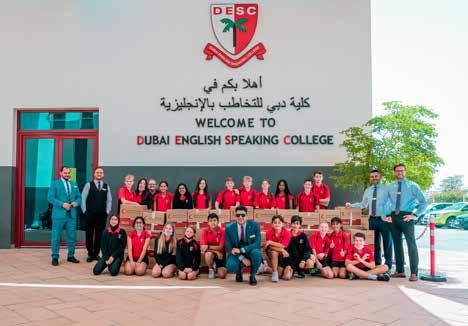
Where did you grow up? Tell us about your family
In the Toon! I grew up in Newcastle with my mum, dad and younger brother. I am very close to my family, especially my mum’s side. I am the only granddaughter, with a sibling and two male cousins, so I ruled the roost, and they will admit I still do! My dad is one of ten so I have a big family on his side; family is very important to me.
I have been with my husband, Simon, for 33 years and we have one daughter, Charlotte, who turns 21 this year and is studying at York University to be a Social Worker. She joined uni in 2020, which was really tough with the travel restrictions, but she amazed us with her resilience and throwing herself into a new life in a new city. She is the president of the University Dance Society and we are so proud of her.
What was your first ever job?
I was a travel consultant for a coaching company. I loved it but could never put myself in the customers’ position by sitting on a coach for 20+ hours even though the holidays were free!
What brought you to Dubai?
My husband was offered a role and it was too good an opportunity for us as a family to turn down. Initially he came out on his own and we joined him for holidays but then we decided to set up our home here. So here we still are 14 years later!
How did you end up at DESS?
I actually interviewed the year earlier for a part-time role at DESC, but the timings didn’t work around my daughter so I had to decline
the offer. Then a position became available at DESS which was fulltime the following year, that I applied for and can honestly say was the best thing I ever did. DESS is a very special place, with such amazing staff and children.
What are your roles and responsibilities?
I am Mrs Dando’s PA and Office Manager at DESS. My role consists of so many different hats which keep me on my toes. During Covid I was the one who sent all the communications to our parents (sometimes late at night-sorry!) This was a very busy time and one I definitely do not want to repeat.
What is the best part of working at DESS?
The amazing staff and children, I work very closely with Mrs Dando and she is just an absolute joy to work with on a daily basis. Our
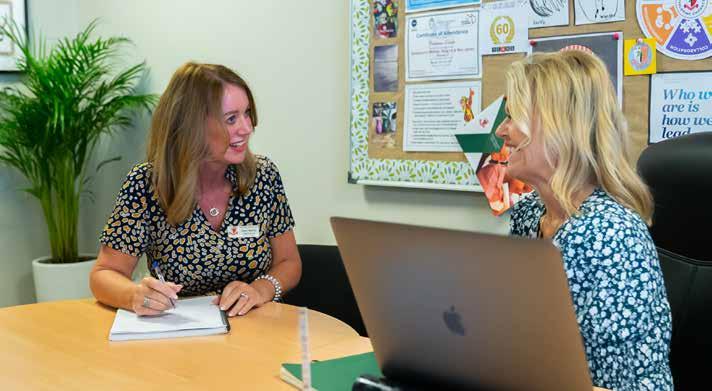
SLT are amazing, and I know how much they all work so hard for our children. The Admin team are the best admin team in the world, always ready to help each other and our teaching staff are all awesome, as Mrs Dando calls us all Team Awesome! It always amazes me that we have over 1000 children, but it still has that small UK primary school feel. I honestly love coming to work.
What have you learned during your time at DESS and what would you take away with you?
The behind the scenes work that goes into keeping the school ticking. No one would believe how much thought, effort and energy goes into the smooth running of a primary school, especially one as special as DESS. When I decide it is time to say goodbye, I will always treasure the amazing friendships and memories I have made here.
Do you have any hidden talents?
Well, along with the lovely Mrs Miller, I can do the John Barnes rap word perfectly!
What would you say are some of your biggest challenges in your role?

Helping Mrs Dando and SLT manage their extremely busy schedules. Inspection can also be a challenging time for me too with the amount of information needed to be uploaded for the inspection teams.
Where do you see yourself in 10 years from now?
I would love to say DESS, but I think it will be back in the UK, living next to the sea or maybe in Europe but definitely beside the sea.
Since its opening in 2014, our FS1 Department at DESS has truly gone from strength to strength! Receiving consistently ‘Outstanding’ judgements in both our DSIB and BSO Inspections, and with a highly experienced, committed and enthusiastic team at the helm, we continue to provide our FS1 children with THE best educational experiences possible!

Constantly striving to be the very best we can be, we were left with one thought: how else could we enhance our children’s provision? Feeling bold and brave, we knew the answer! And, so was born, the first ever FS1 trip: FS1 Adventurers 202223 braving the ‘Great Outdoors’.
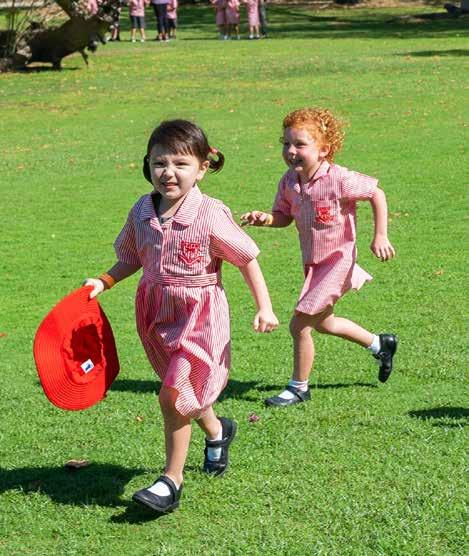
Once decided, lots of planning and preparation ensued by the team, whereby for weeks on end we provided our FS1 children with experiences to ensure they knew how to navigate their first ever school trip. Linking to our Term 2 topic, ‘Life on Land’ as well as our ‘DESS 60th’ celebrations, we decided that a grand tour around famous Dubai landmarks would be the best way to engage our littlest people in their local, yet majestic, environment.
In Making Maths Magical, the children enjoyed many outdoor experiences, involving directions, routes and map reading. We had fun finding pictures around school and learning language related to directions, which supported the childrens’ understanding of journeys and how we would explore Dubai. Becoming familiar with size and measurement, we built structures and discussed how tall or long the buildings were, using
tape measures. In Expressive Arts, the children had fun singing songs related to Dubai, painting pictures of the iconic buildings we would see, as well as creating their own Dubai structures, using an array of building materials. In Literacy, the children began using their phonic knowledge when talking about what we would see and hear; we listened to initial sounds in building names, described what we might hear at Creek Park, and labelled drawings. In Understanding the World, the children were fascinated to learn how old or new buildings and structures were, by relating them to their own age, alongside that of their parents and even their grandparents! The children showed great curiosity at looking at
buildings from other countries too and sharing experiences with each other during Circle Time and ‘Do Time’ activities.
The anticipation was reaching fever pitch and the excitement was contagious, as we began collaborating to create maps to take with us on the journey. Together, through communicating with each other in small groups and showing excellent critical thinking skills, the children brought their maps to life with pictures of all the iconic buildings and structures they would see, placing them in order of the bus route we would be taking. It was incredible to hear their sophisticated use of positional language too.
Waking up full of excitement, it was hard to tell who was more excited, the staff, our parent helpers, or the children themselves! After registration, the intrepid travellers all made their way, class by class to the school buses, armed with their backpacks, maps and hats! Every adult and child excitedly arrived to find the drivers and bus attendants waiting for us. We were happily greeted and helped onto the buses, where the children found their seats and were strapped in ready for their first FS1 adventure outside of the school premises! Before we knew it, we were on our way, waving excitedly to the school behind us. The sun was shining, and the sky was blue, as we began singing songs and making sure our maps were ready to use. Using their collaboration and communication skills, they navigated their bus journey by looking at their maps and locating the buildings in real life. As each building came into view, there were ‘whoops’ and cheers throughout the buses. During the journey, we located the Burj Khalifa, Museum of the Future, Jumeirah Mosque, Union House flagpole, QE2 and
Dubai Frame!
Tummies were beginning to rumble as we sang our final songs, while pulling into Creek Park. Once safely through the park gates, the children excitedly made their way to the picnic area. It was such a beautiful morning of chatting, playing in the playground and eating our delicious picnic food. Before we knew it, it was time to head back to the buses and make our way back to school.
The team and our parent helpers agreed it was a fabulous experience for our FS1 children. Upon returning to class, we talked about our adventure and shared with each other the highlights and memories of a very special day. This is definitely the beginning of more FS1 adventures to come ...
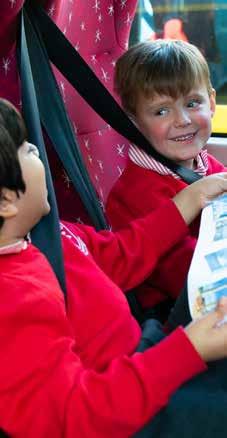

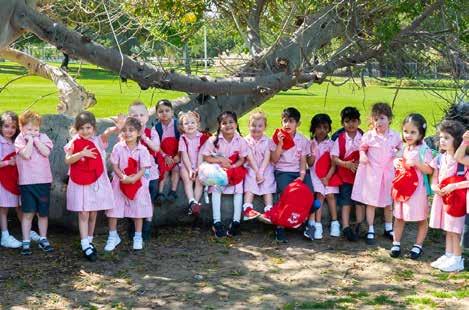
of importance given to celebrating UAE culture, Islamic values and Islamic education. The school culture, values and ethos place a high priority on promoting Islamic values throughout its wonderful community. Islamic values, such as kindness, compassion and charity, form an essential component of the DNA of DESS; it is instilled within the leadership of the school, who provide the vision and through the teachers who develop lessons and experiences which promote Islamic and national identity values.
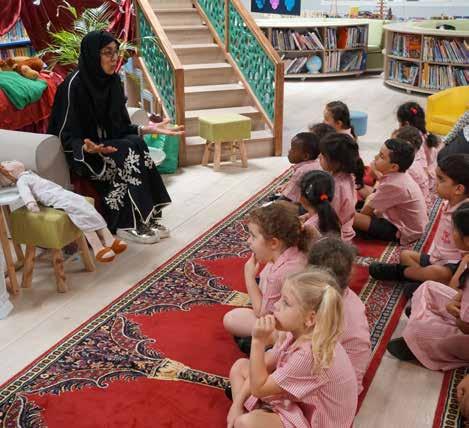
What about children, teachers and parents, Grandmother? How do they show that they care about the school community?
What kind of story are you going to tell me today, Grandmother?
I will tell you a 60-year-old historical story, my dear – listen with all your heart. It is a story from ‘the good old days’. A story that reminds us of an unforgettable time that still has an impact, even after all these years.
Our story begins in 1963 in a room on the top floor of a villa where expat workers lived. It consisted of one classroom and ten children being taught by both parents and a British officer named Lieutenant Pilot F. Loughman. This establishment
continued as a school for a further four years until 1967. It was in this year that Sheikh Rashid allocated a large area of land in Oud Metha for education, and a site was allocated for the school on this land. Until today, the wonderful ‘Dubai English Speaking School’ remains on this gifted land, and we are proud to be celebrating our 60th birthday this year.
To this current day, DESS truly appreciates what Sheikh Rashid gifted to them. One of the ways that this can be recognised is in the level
DESS cares about everyone and focuses on creating good people for the world that flourish and shine in all that they do. Teachers promote the values of the school and UAE community through ‘Like a DESS child’. Islamic and Moral Education lessons at DESS focus on encouraging tolerance, respect, kindness, acceptance of diversity and global citizenship. These values are part of DESS school life. Children appreciate and understand how Islamic values influence contemporary life in the UAE and reflect these in their own lives and experiences, incorporating several of these values in their daily behaviour.
The Islamic Education curriculum at DESS develops an understanding of religious traditions and the appreciation of the cultural differences in the UAE today. Muslim students reflect on their own experiences, develop a personal response to the fundamental questions of life, develop investigative and research skills, make reasoned judgments about religious issues, have respect for other peoples’ views and celebrate the diversity within society. Islamic teachers care about the
DESS community and ensure Islamic Education is a vital component in the children’s education. The knowledge of Islamic values and an awareness of spiritual and moral issues in life is of utmost importance for all children learning at DESS. Over their 60-year history, the teachers have continually developed their teaching and learning approaches; they have incorporated multiple strategies to engage students as active participants in their learning. The Islamic teachers at DESS continue to not only be passionate about the subject matter, but also recognise the immense responsibility that they had been entrusted with.
The Islamic values of tolerance, kindness and honesty are shared with the entire DESS community through the community ethos and focus on positive relationships. Special events throughout the year promote an understanding of these values and UAE culture. The Holy Month of Ramadan brings people of multiple faiths and nationalities
together at one table during the DESS iftar event. A whole school Ramadan assembly teaches all the children about the importance of the Holy Month.
Even within the youngest years at DESS, the children enjoy learning about UAE culture and values. With the support of the Islamic teachers and their class teachers they learn about the legacy of Sheikh Zayed, the seven emirates and UAE cultures and traditions. Developing a sense of pride in their home country and culture, the Emirati children proudly teach their peers how to say As-Salaam –Alaikum and the meaning of these special words.
Parents give their full support to their children’s studies in Islamic Education, for example by helping their children with their Quran memorisation and recitation at home. In our yearly Quran competition the children demonstrate this dedication practising their Quran recitation with Tajweed.
Tell me more my Grandmother, how do Islamic values and education at DESS help the local community?
Islamic values and charity play a significant role in the ethos of DESS as they believe that it is important to instil in children the values of generosity, kindness, and compassion. Charity is one of the five pillars of Islam and is an important part of the faith. DESS encourages the children to give both time and funds to local and international initiatives by regularly organising charity events and fundraisers. These events aim to raise funds for various causes such as aiding disaster relief efforts and providing education to underprivileged children. DESS also emphasises the importance of empathy and respect for all, regardless of their background or circumstances. By instilling these values in the
children, DESS aims to create a generation of compassionate and socially responsible individuals who will contribute positively to society.
The community at DESS, through DESSCares, actively supports local and international communities and charities through both fundraising and raising awareness. For example, let’s start with the charity jars! Every year as part of their Islamic Education lessons, the children at DESS make their own charity jars; an amazing initiative that raises funds for those in need. DESS has also partnered up with a National Charity School to have donation boxes around the school for children to build the habit of giving sadaqa to help others who are less fortunate, many Items such as food and drinks are also donated to charity.
This is how DESS presents Islamic values in the school, my granddaughter, I hope you enjoyed the story.
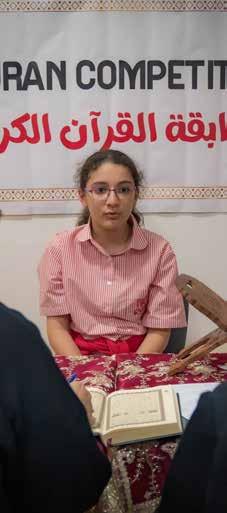

DESS is an incredible school which has had phenomenal success over its 60-year history. From being the first British Curriculum school in the UAE, to being voted the Best Primary School in the UAE. From Outstanding inspection ratings awarded by both the KHDA and BSO (British Schools Overseas) to multiple achievements on the sports field, stage, swimming pool and beyond! These achievements, and the many others too numerous to list here, reflect just how amazing our children and the teachers who are there to guide and support them are.
But each and every day, behind the scenes, our site staff work tirelessly to ensure our school runs smoothly. From long before the first bell rings until way after the last child is safely on their way home, they are the unsung heroes of DESS, working
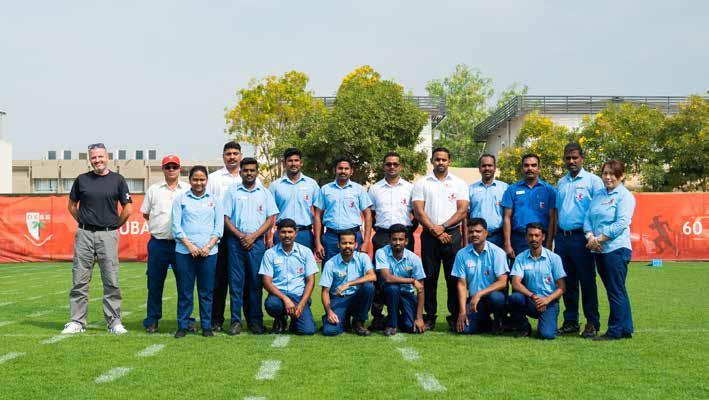
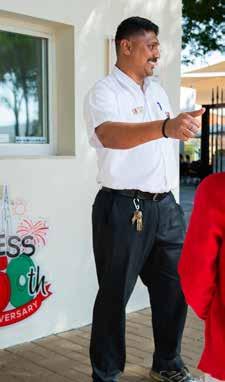
to provide the platform to allow all the magic to happen.
They are quietly involved in all aspects and areas of school life, from maintaining the school grounds, to keeping the classrooms clean and tidy, to providing a safe and secure environment for our children. They are always willing to lend a helping hand, no matter what the task. They are integral to the smooth running of our school events. Whether it’s setting up for a school assembly, international day or the latest production in Latifa Hall, helping out with a sports day or a tournament we are hosting, our site staff are there to ensure that DESS is ready for business!
They are always so cheerful and friendly, always willing to go the extra mile to help out. They are the unsung heroes of our school, and without them, DESS would not be
the same. So, let’s take a moment to celebrate our site staff for all the hard work they do. They deserve our appreciation and recognition for all they do to make DESS awesome!
This half-term, the English department launched their inaugural creative writing competition: DESCreates! The competition is open to all Key Stage 3 students and ties in with our fiction writing curriculum. Year 7 students are focusing on the theme of disaster, Year 8 are focusing on the theme of relationships, and Year 9 are focusing on the theme of fantasy.
To launch the competition, we were honoured to host Annemieke Woodbridge, founder of Young Author Academy, who will be working with DESC students as part of the competition. In a creative writing workshop on Wednesday 8th February, Annemieke shared her experience as a writer and publisher and provided valuable tips for the students’ writing journeys –from planning, drafting, writing, proofing all the way through to final execution and, most excitingly: publication.
All students, as part of their Red Week assessment, will produce a creative piece of writing; these entries will be graded in the normal way and the best pieces from each class will be put forward to Young Author Academy. Annemieke, with the help of Mrs McAnena (DESC librarian) and me, will choose a selection of the most creative pieces from each year group to feature in a DESC collection of short stories, which will be published and available to purchase on Amazon. There will also be Amazon vouchers available for the most compelling pieces in each year group.
DESC students already have an established history as phenomenal writers, with a number of students having published their first novels. I spoke to Kenmi Kosgalage, one of our talented Year 8 students who has recently published her first novella, The Adventures of Lia: The Unknown Catnapper. Kenmi started writing during lockdown to keep herself busy and this simple pleasure transformed into her very first novel, which is available to read in the DESS and DESC libraries. I asked Kenmi for her top tips to support students with the competition:
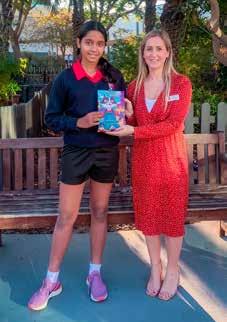
During the pandemic, I had a lot of free time and I remember reading a great deal of books. This inspired me to have many creative ideas, so my parents suggested that I write a book of my own.
Did you experience writers’ block and how did you overcome this?
Yes! While writing my book, I felt like giving up multiple times because I didn’t know what to write next. However, whenever this happened to me, I would take five minutes to relax and refresh my brain, read my latest paragraph, write down some bullet points and I would be back to writing the next chapter.
How did you feel once you had completed your first novella?
I remember looking at it and feeling a sense of success and accomplishment. I was also a little nervous about what everyone would think about it, but still very excited.
What would your advice be to other KS3 students who want to publish a novel?
My advice for anyone is just go for it, and who knows, maybe it will be a best seller. Don’t ever be afraid to write from your imagination! It’s as Beverly Cleary says, ‘If you don’t see the book you want on the shelf, write it.’
We hope that all KS3 students have embraced creativity and the English department are excited to witness the incredible work that DESC creates!
The Great Outdoors: a vast, natural space that allows for roaming free and exploration, where we see our children (and often, ourselves, as adults!) truly come alive. Feeling the sand in our toes, the ocean waves and wind in our hair, the sun’s warmth on our skin, these are just a couple of examples of how we can feel as one with nature and appreciate Earth’s beauty! How many of us as children remember experiences of climbing trees, riding our bikes and running in fields, as well as the rush that this gave us? Plenty of us have experienced this as educators and as parents, therefore we have an immense responsibility to ensure that our Dubai-raised children experience as many outdoor pursuits as possible, before our inevitable UAE summer climate commences year on year!
At DESS, we start this as early as 3 and 4 years old in Foundation Stage, with a large majority of the year spent outdoors. Each outdoor space is dedicated to the seven areas of learning, ensuring that children have experiences that allow them to understand and explore the world around them. Whilst we recognise that being outdoors provides fun and excitement, it’s also essential for children’s development, with physical development proving just as important as language and

cognitive development. When outdoors, children are provided with physical opportunities, allowing them to build their gross motor muscles, through jumping, climbing, skipping, throwing, catching, balancing and pedalling, as well as opportunities to refine their fine motor skills, such as grasping, scribbling, building, scooping, transferring and pouring. All of these skills are continued in Key Stage 1, through outdoor Continuous Provision experiences, with learning happening outside of the classrooms in dedicated outdoor areas. In addition to developing gross and fine-motor skills, our DESS children are even reducing their chances of short-sightedness by being outdoors!
Furthermore, by allowing exposure to sensory, messy experiences, such as mud kitchens, sand and water play, we are enhancing children’s creativity, understanding of textures, exploration and expression of their imaginations, as well as producing neural connections to the world around them. Immersion in natural, outdoor learning environments also inspires open-ended, critical thinking to arise; a valuable 6C skill to ensure our children are equipped for life ahead.
It is undeniable that sensory
The outdoors offers limitless potential to young children. It becomes a place where they can go to relax their mind, to be inspired and deep dive into the world of imagination. It’s a place where they can design, create and explore. The possibilities are endless.
experiences and memories are the strongest and last the longest and as educators, we have a strong commitment to continuing to grow these experiences as the children progress into Key Stage 2. From reading gardens to our flourishing Sustainability Garden, from tending to classroom planters and window boxes, to conducting Science or Maths enquiries, the children are encouraged, wherever possible, to continue to make magical discoveries and cherished memories outdoors.
Another essential part of DESS’ outdoor learning offer is our residential trip programme and this academic year, we have supercharged the experiences on offer! All children in Years 4 to 6 can attend camp at The Adventure Centre, Hatta. Learning survival bushcraft skills, taking part in wildlife studies, trekking around the dam and learning to orienteer, are just some of the exciting activities available. As well as Hatta, a group of Year 6 children will be
travelling to Cyprus to take part in a week-long environmental studies trip, engaging with the natural landscape and ecosystem of their surroundings. Recently returned Year 5 and 6 children enjoyed the awe and wonder of the majestic mountains of the French Alps on our newly reinstated Ski Trip.
Many studies, such as Harvard
University’s biologist, Edward O. Wilson’s ‘biophilia’ theory, confirm that adults and children are instinctively drawn towards natural surroundings. Thus it is unsurprising that the multi-sensory experience of being outdoors is exceptionally beneficial to our mental health and wellbeing, with outdoor learning allowing our children to risk-take, and consequently build confidence and self-esteem. Engaging their five senses further allows opportunities to be mindful and fully ‘unplug’ from everyday life, supporting emotional self-regulation.
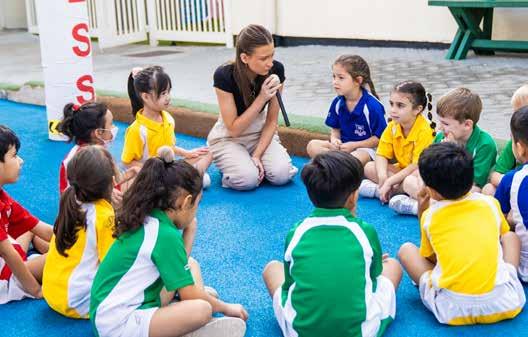
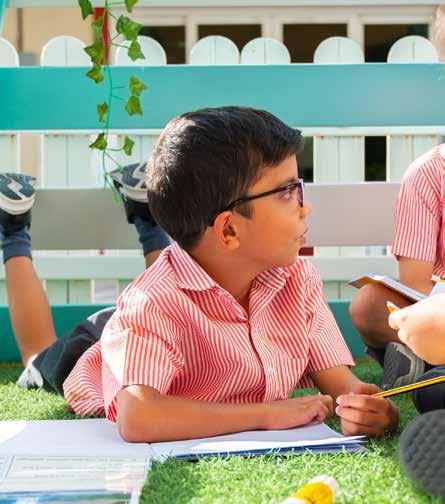
As Albert Einstein famously quoted,
So, be brave adventurers, DESS … go forth and explore life beyond four walls!
Look deep into nature and you will understand everything better, including yourself and the world around us.
Can you tell me about the DESC T&L vision and the ethos behind it?
Michael Fallon: Our motto at DESC is Dare, Excel, Share, Create and we ask both staff and students to live this out every day in the classroom. We want every teacher to push themselves to get even better and take responsibility for their own development. In turn, they are provided with an extensive menu of opportunities to develop whilst also receiving the support and encouragement to enable them to take risks and try new strategies and techniques. In turn, this leads to a positive learning experience for our students. We want our students to enjoy their learning experience and engage fully in every lesson which, ultimately, has a positive impact on their outcomes.
Can you tell me a little about the T&L team at DESC?
Katharine Roberts: DESC’s Teaching and Learning team has six members of staff from a range of departments across the College. Our role is to continue to develop teaching and learning, to motivate, inspire, support and challenge staff to take risks in the classroom to further improve the DESC students’ learning experiences.
Our small but mighty team work tirelessly behind the scenes researching and creating content to provide a range of opportunities for staff to engage - both in person
and online - in ‘DESCified’ T&L focused Continuing Professional Development (CPD).
What are the most rewarding parts of your role in the T and L Team?
Stefan Treble: One of the most rewarding aspects of being part of the T&L Team is the opportunity to help DESC staff to learn and develop their skills and to reinforce the high standards of teaching at DESC. It is incredibly satisfying to support DESC teachers to grow and improve, and to see our teachers celebrating students’ success with the skills and knowledge they have obtained through the T&L PD sessions.
Being a member of the T&L Team provides a deep sense of purpose and meaning. By contributing to the learning and development of our students, we empower our teachers with the tools to cultivate the next generation of DESC learners and leaders. It is a privilege to be part of such a meaningful endeavour, and to know that our efforts can have a lasting impact on the lives of DESC students.
As a new member of the team this year, what inspired you to want to join the T&L team?
Terri Frost: One of the things I love about DESC is the range of professional development opportunities that staff can access in order to become the best teacher they can be. I was chosen as a
DESCpert shortly after joining DESC and found that I really enjoyed helping and supporting other teachers in that role, so it felt like a natural progression for me to apply to join the T&L team.
I loved how active the T&L team was in motivating and inspiring me to take more risks and try new things to be a better teacher and I am incredibly grateful and privileged to have the opportunity to do the same for other teachers here at DESC.
Jack Brown: Celebrating the amazing teaching and learning that takes place across the college is so important! At DESC we recognise and, indeed, celebrate this in various ways.
Firstly, our monthly bulletin includes a ‘departmental spotlight’ whereby different departments have the opportunity to showcase creative and innovative ways of teaching their subject, sharing and celebrating great teaching across different subject areas. Another addition to the bulletin is our ‘staff shoutouts’ section, whereby teachers and support staff can nominate colleagues for the fantastic work they do!
Secondly, student feedback plays an important role in celebrating Teaching and Learning at DESC. Feedback from events such as our ‘study skills sessions’ offer
opportunities to highlight (and subsequently celebrate) the positive impact that these learning experiences have on our students.
Finally, once a year we have ‘Pineapple Week’ at DESC. This weeklong event is a great way for teachers to observe and learn from one another, in addition to celebrating the exceptional practice seen across the College. A brilliant week which is enjoyed by all!
Can you tell me a little bit more about Pineapple week?
Stevie Leigh-Bennett: We wanted to give our staff body the opportunity, as teachers, to collaborate, observe, ask and reflect. At DESC, we have some of the very best Professional Development available to us under our own roof.
We promoted an open-door policy, and all staff were encouraged to visit another teacher throughout the week; this could have been a teacher down the corridor or in
The variety of different techniques, strategies and tips that teachers picked up across the week were endless. It was fantastic to see so many teachers embracing Pineapple Week and to see that they had a desire to develop their expertise. We also facilitated the opportunity to celebrate and appreciate the learning that takes place on a daily basis by asking the teachers to give each other a ‘Shout Out’. These were then posted in our Pineapple Picks of the Day.
We believe that this has encouraged informal observations to take place more regularly, so much so that the verb ‘Pineappling’ is starting to become part of DESC’s vocabulary.
How do you continue to motivate and encourage staff to engage in CPD focused on Teaching and Learning?
Richard Lynch: DESC continues to develop and offer a wide variety of
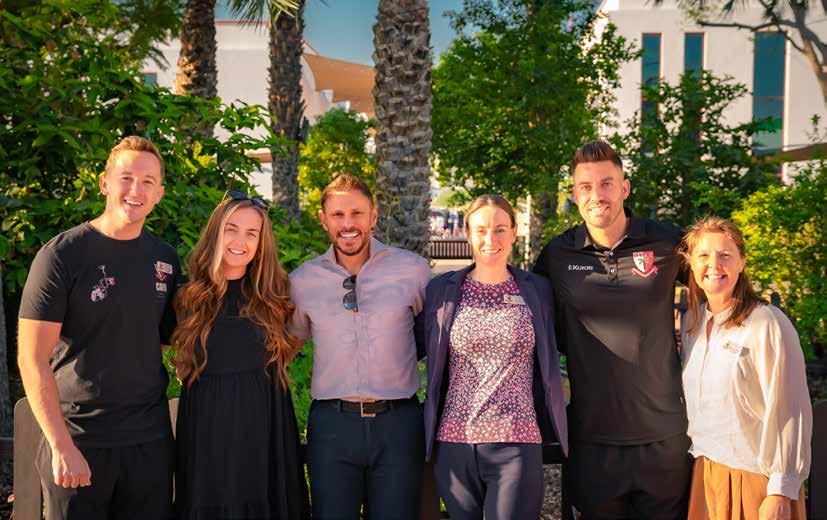
ways that staff can engage in CPD with a focus on the development of classroom practice. We believe that having variety and the element of choice are hugely motivating factors to support staff in adopting the DESC ethos of ‘getting even better’ with quality teaching and learning being at the core of what we do.
The identification of our ‘DESCperts’ across the College, each specialising in an area of our Teaching and Learning Centre enthuses staff to continually showcase themselves at their best. DESCperts are identified as role models in their area and play a hugely important role when supporting colleagues with their own personal development.
Among other initiatives, DESCperts are paired with colleagues to engage in personal learning conversations. Staff can seek advice to specific questions and DESCperts can offer their ideas and advice to support them.
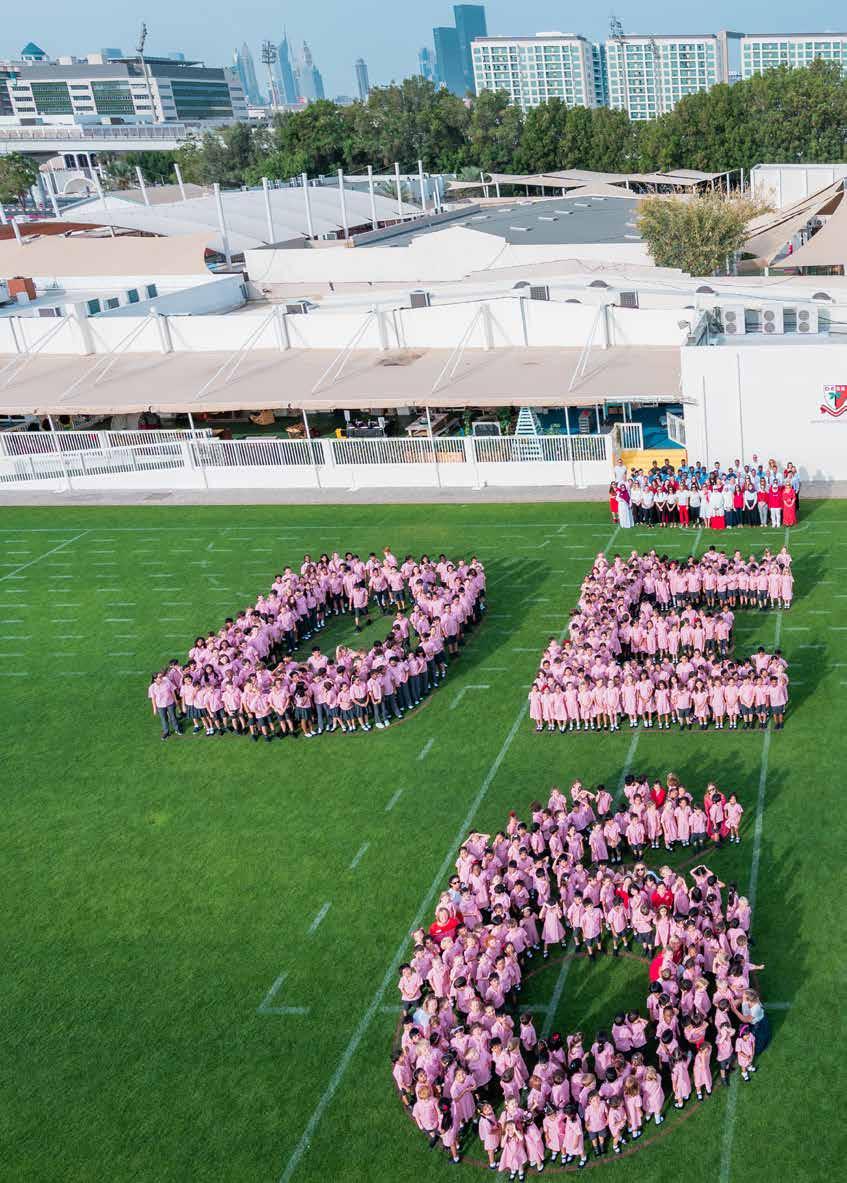

WWW.DESSC.SCH.AE
desc_parentvoice@dessc.sch.ae
dess_reception@dessc.sch.ae